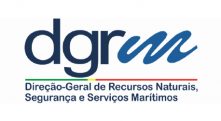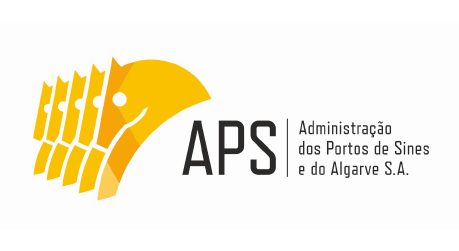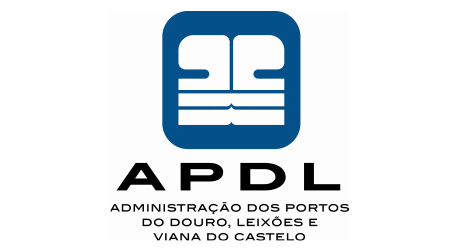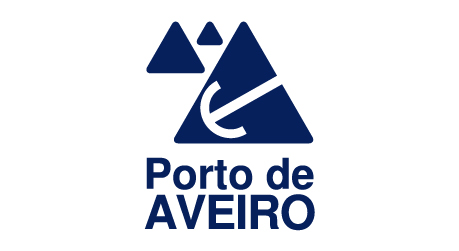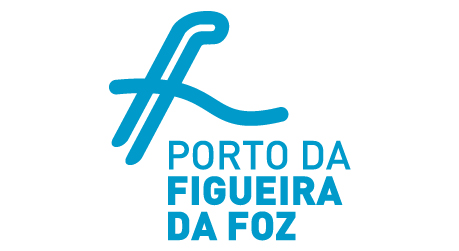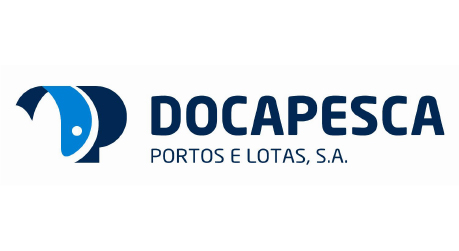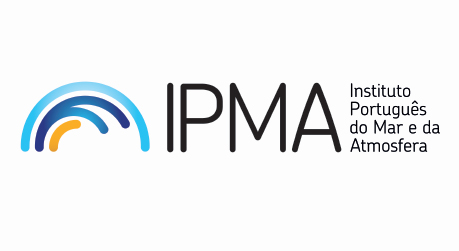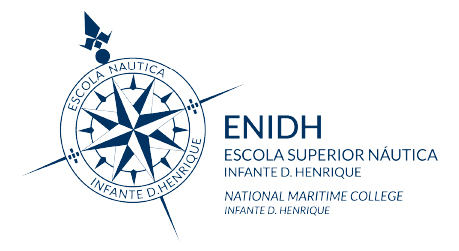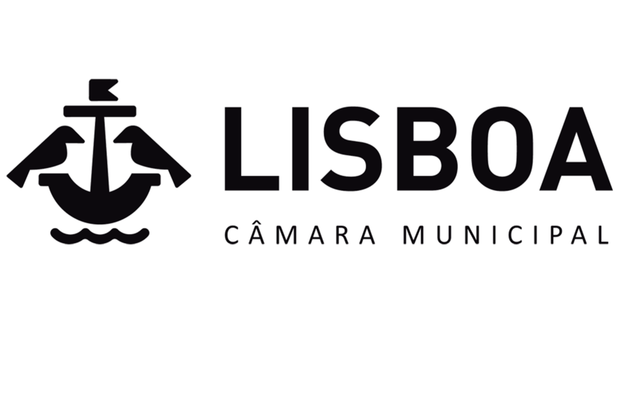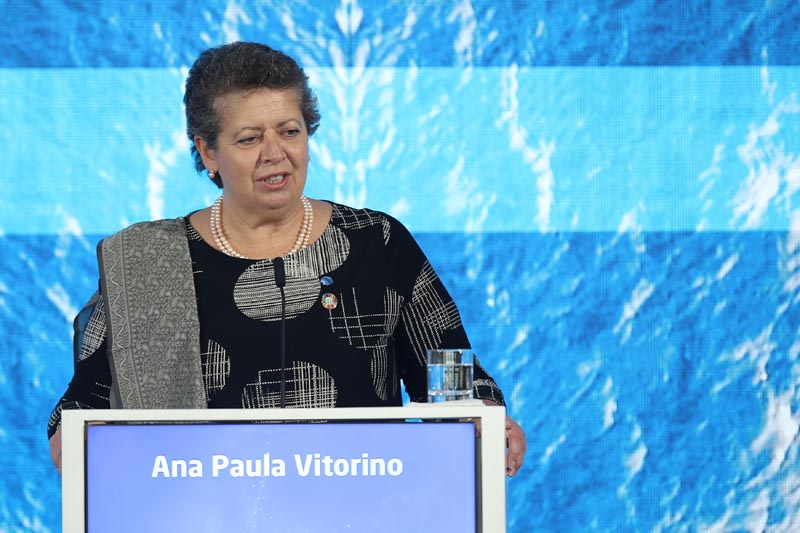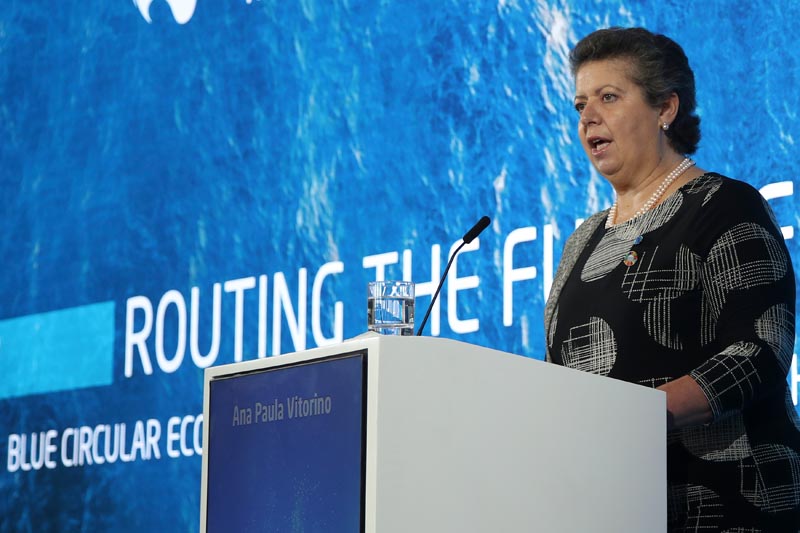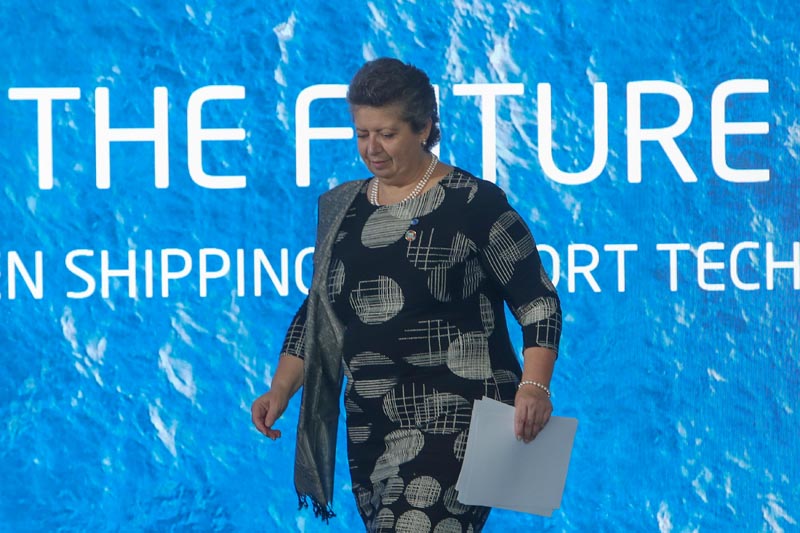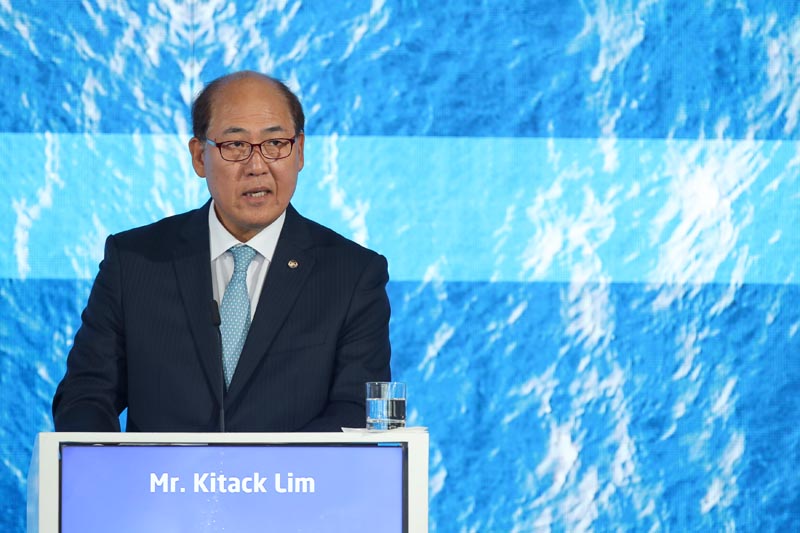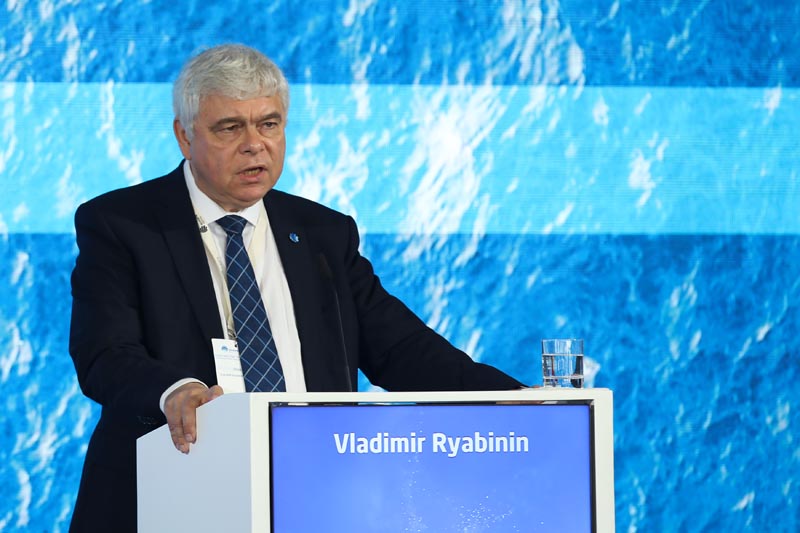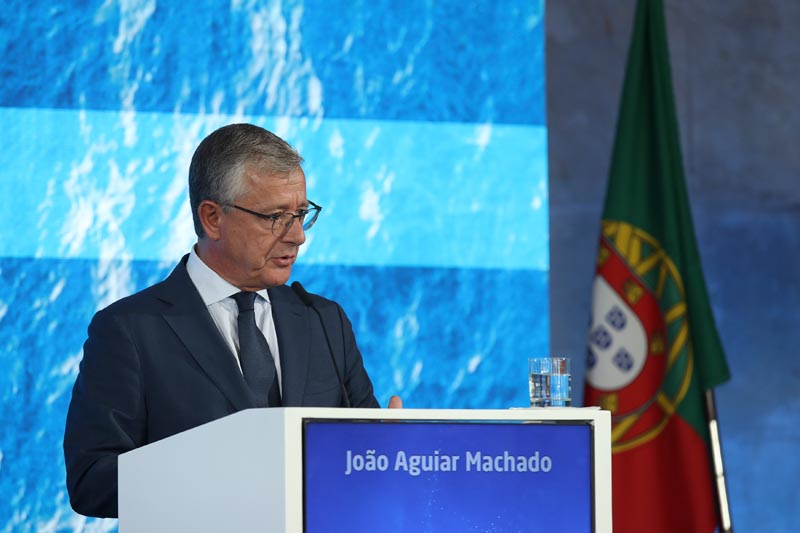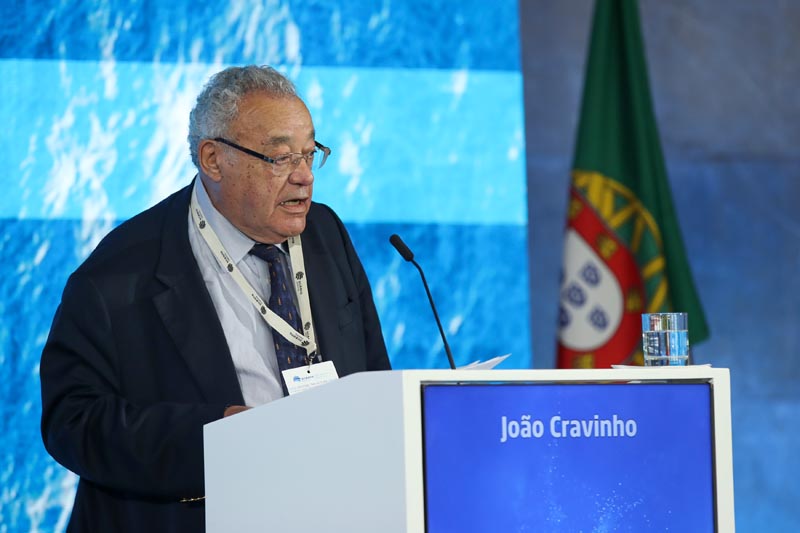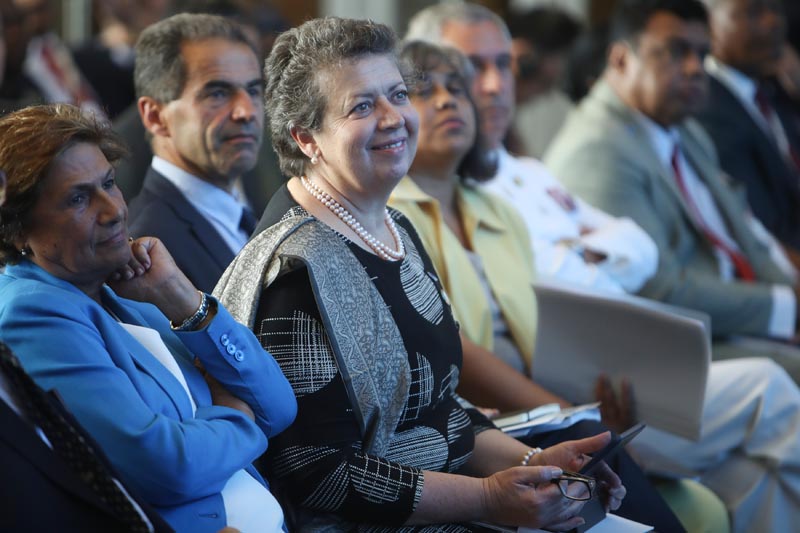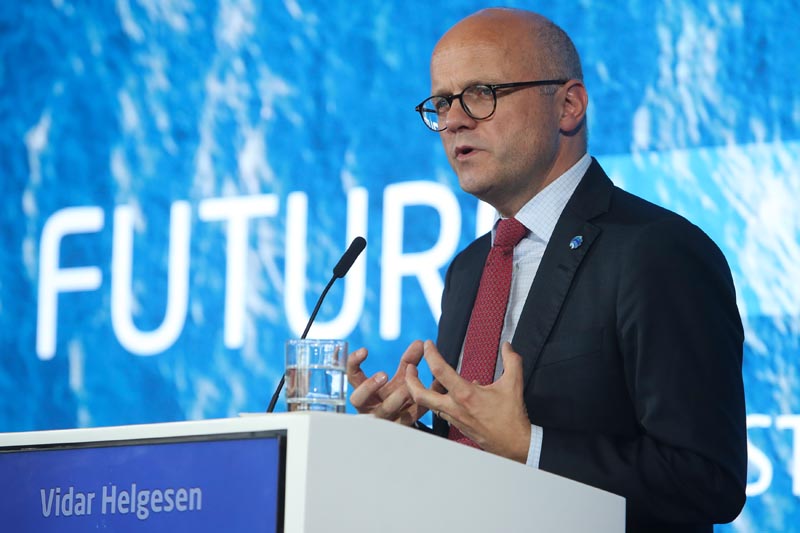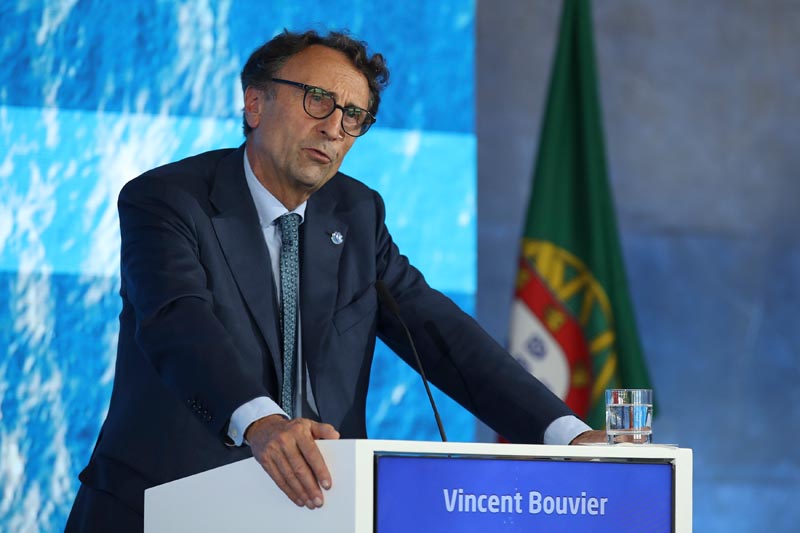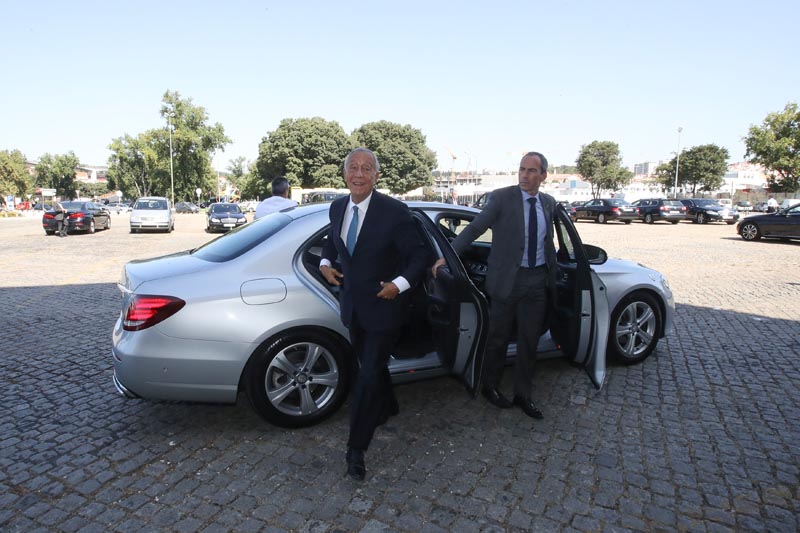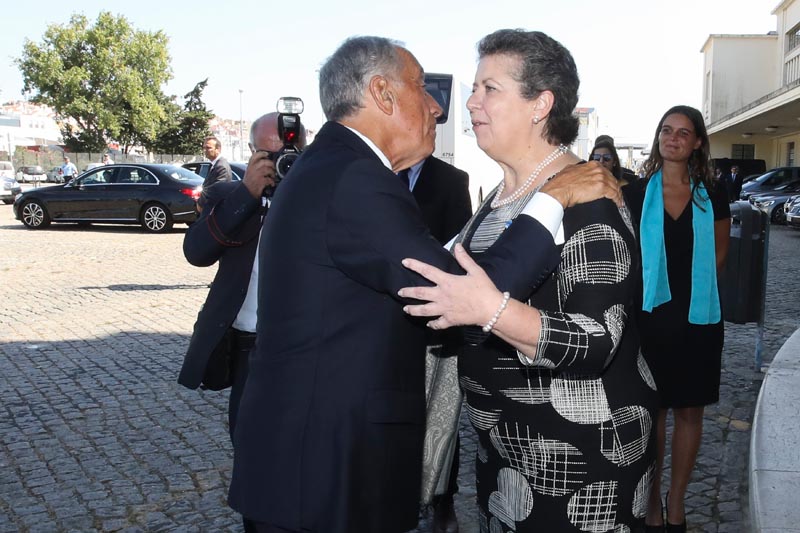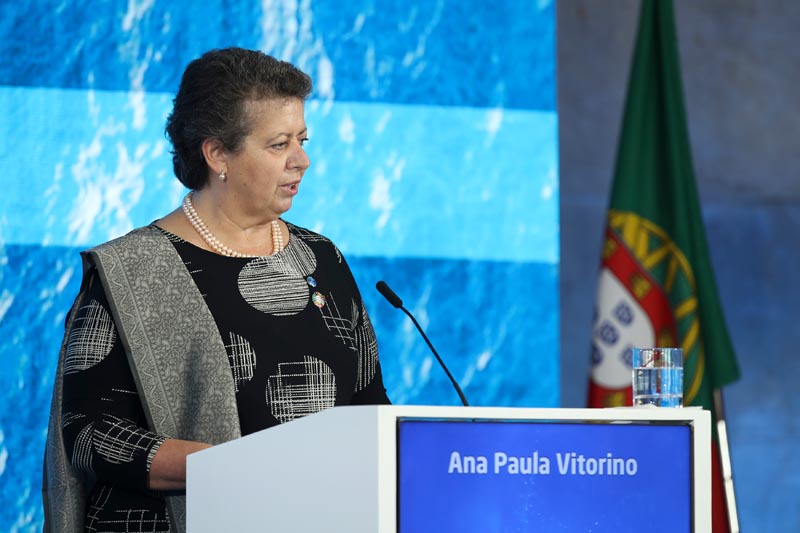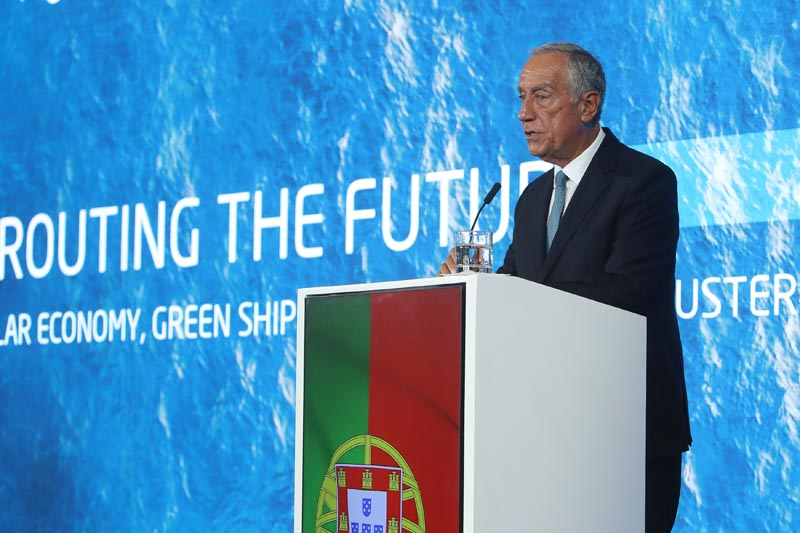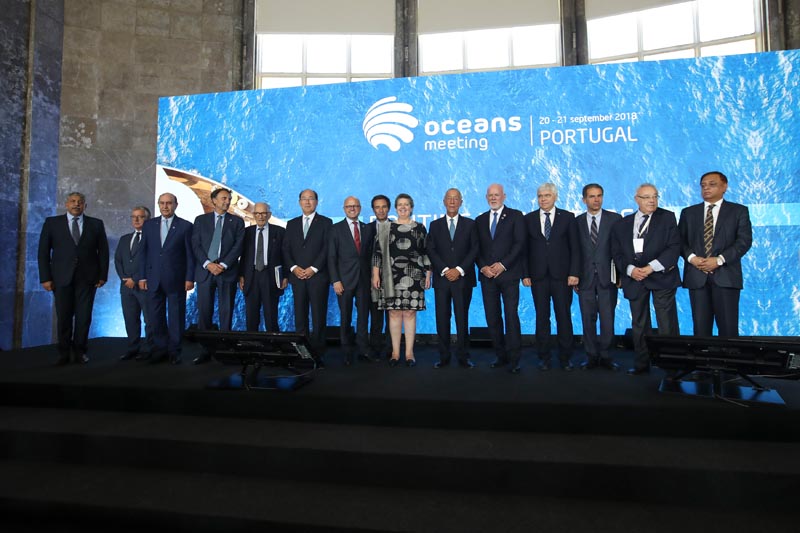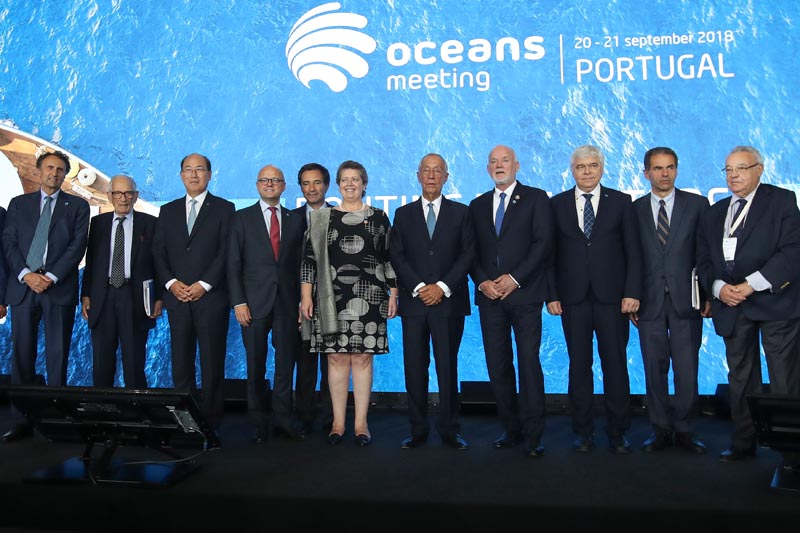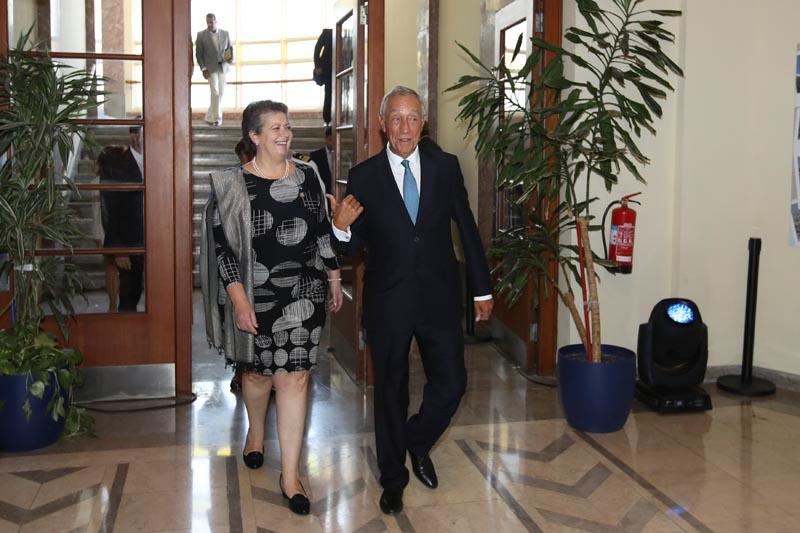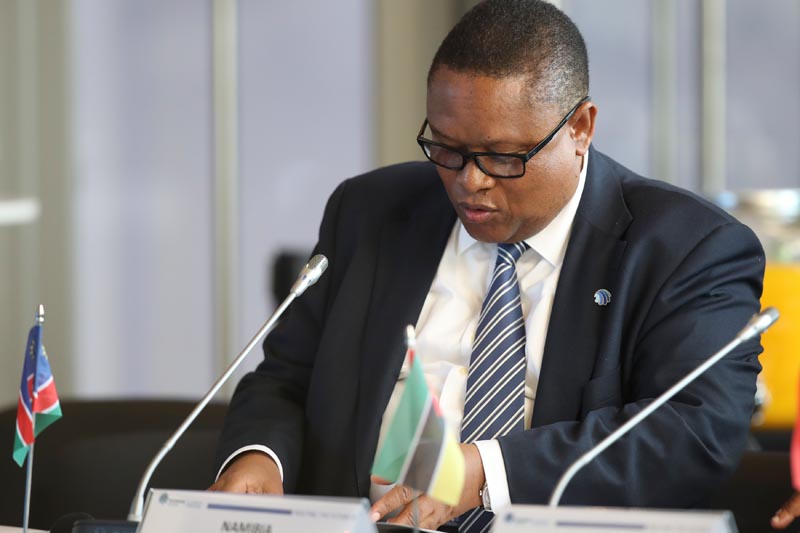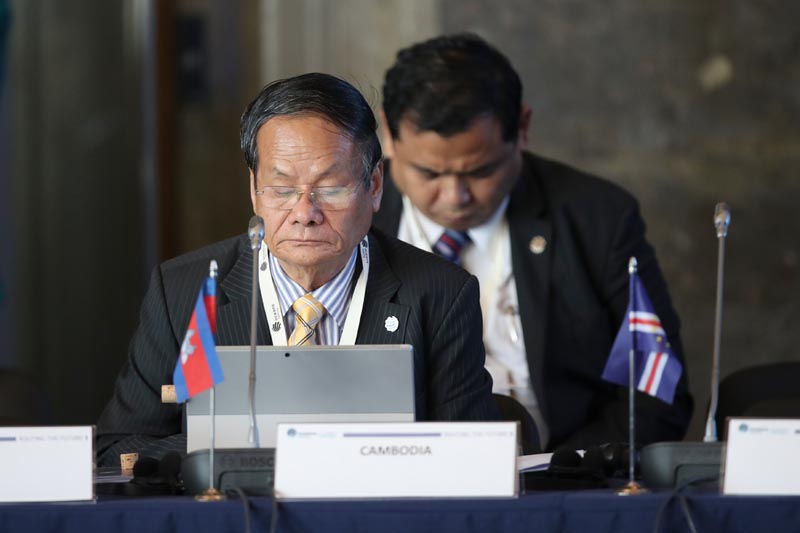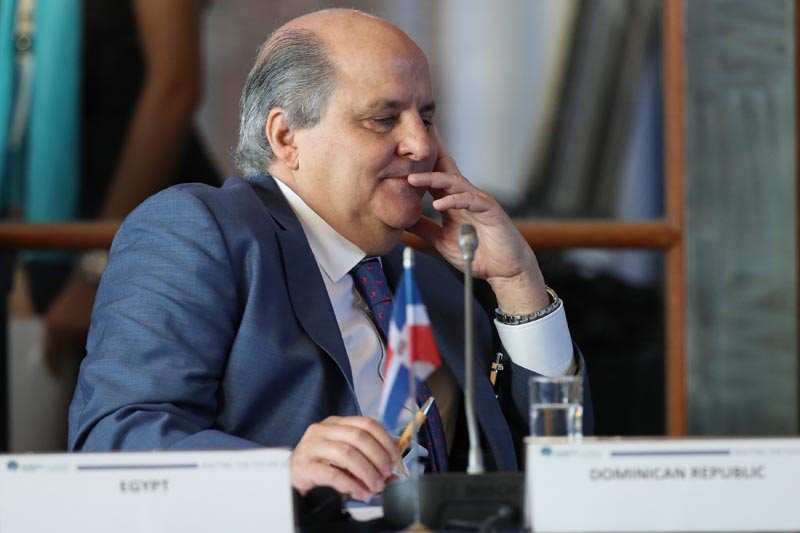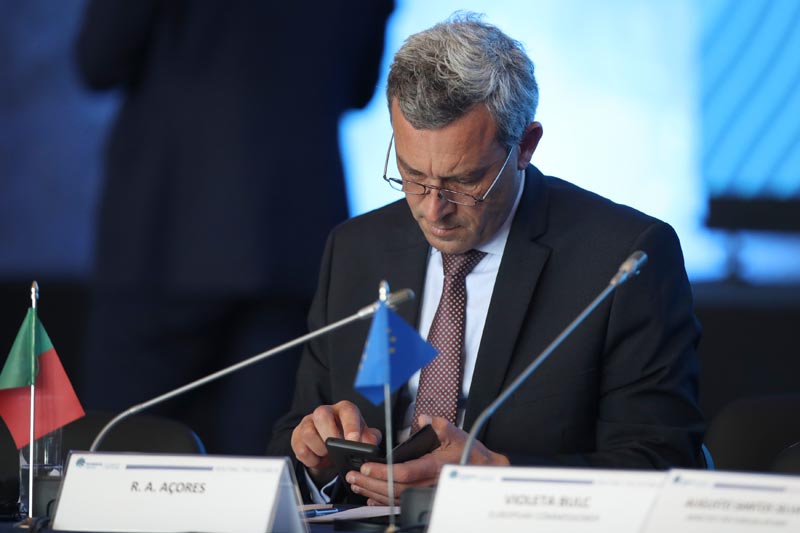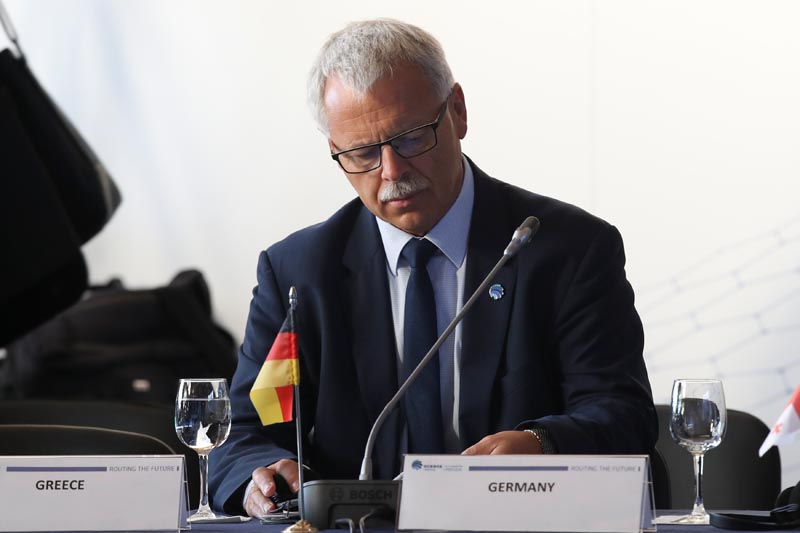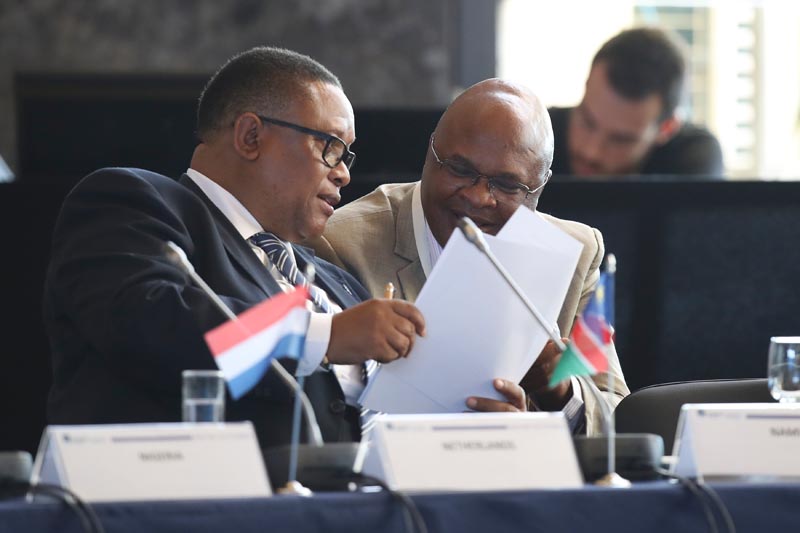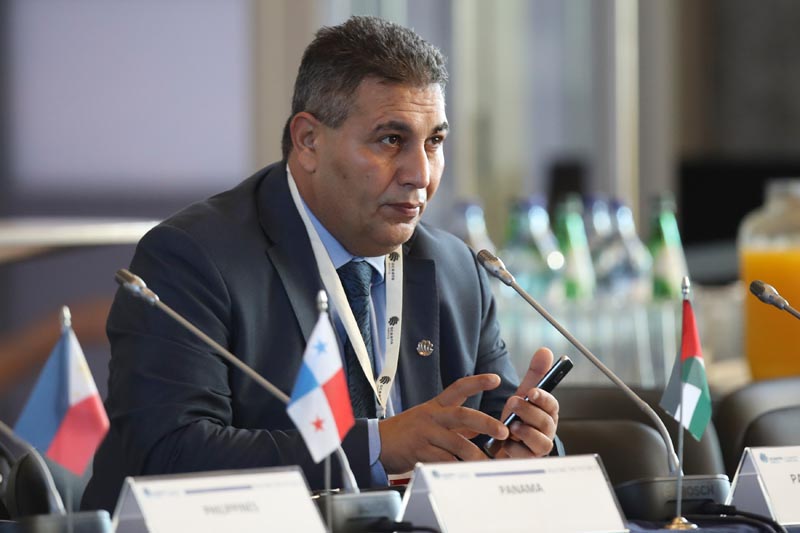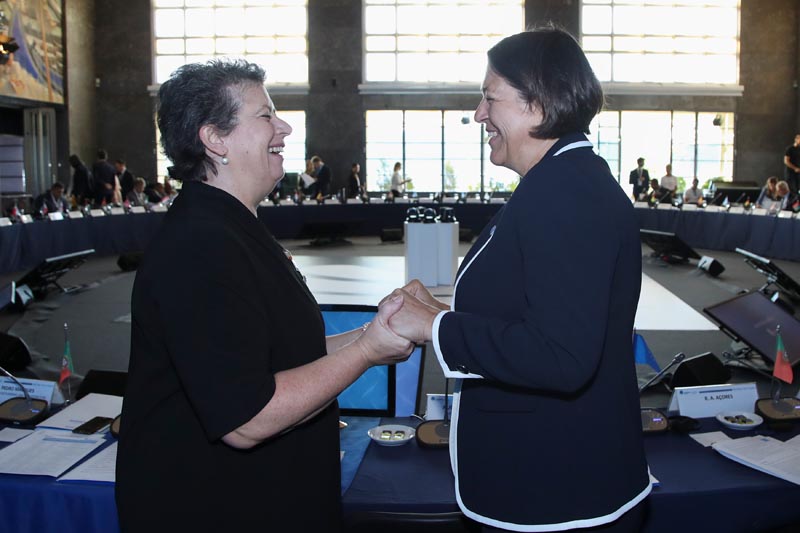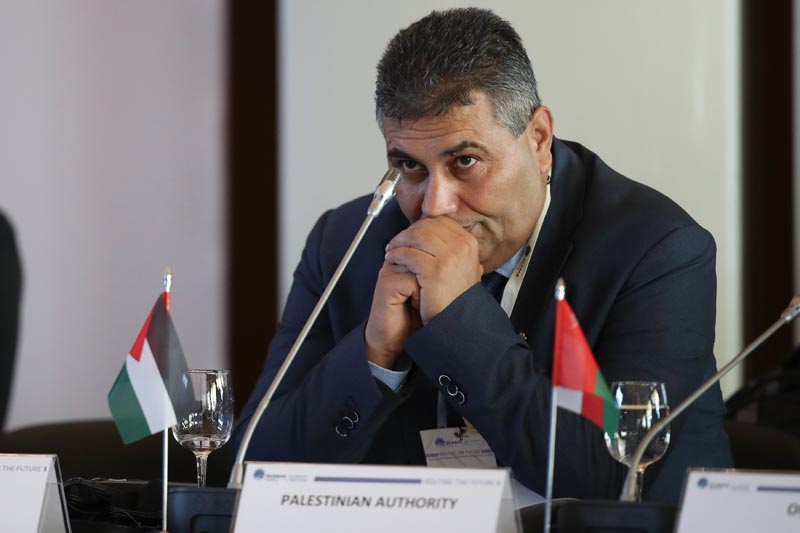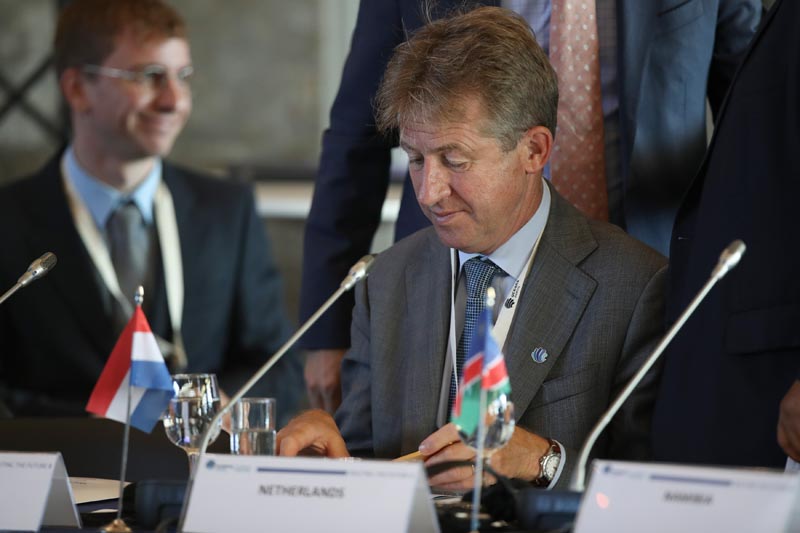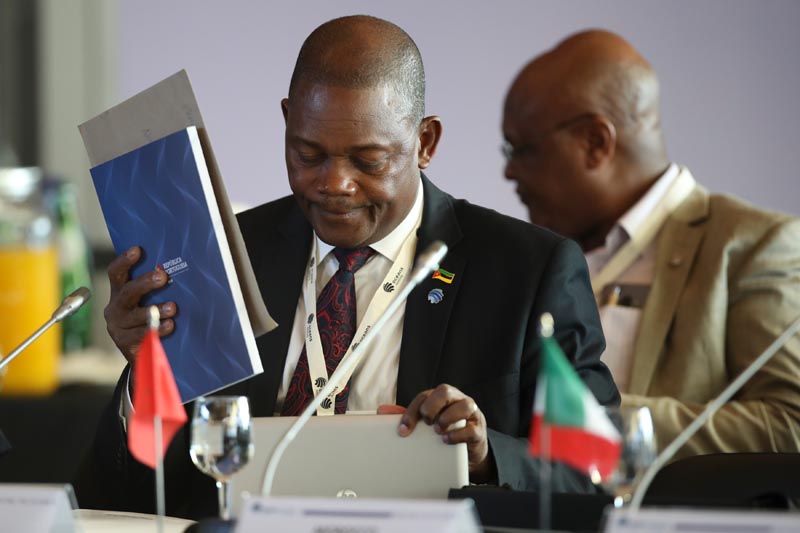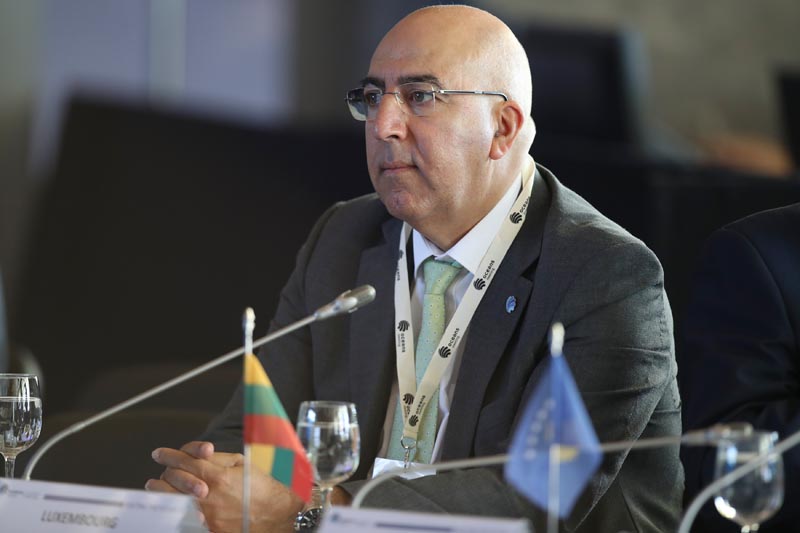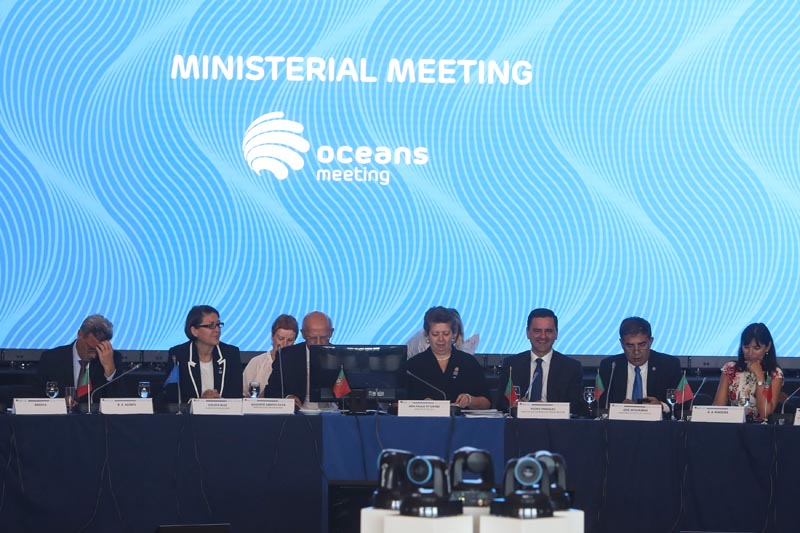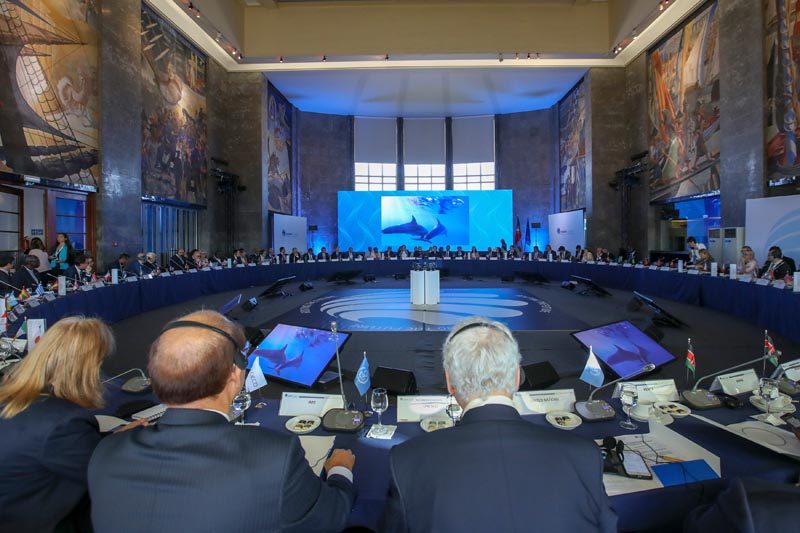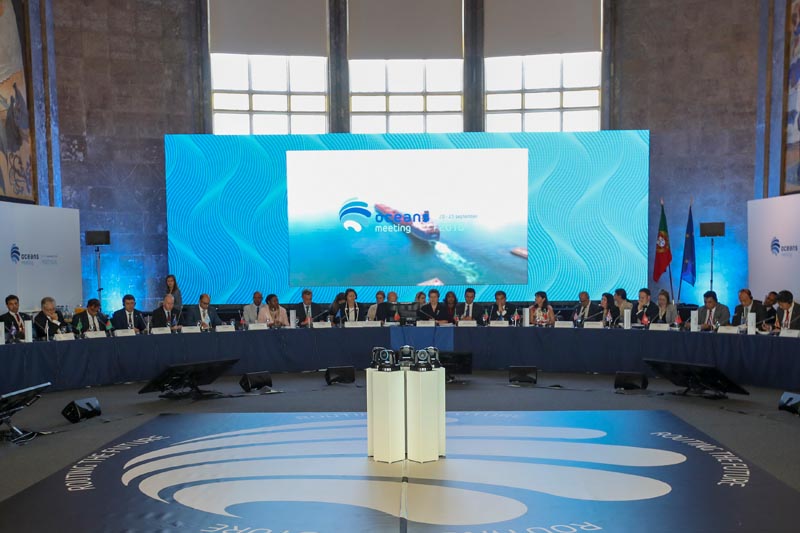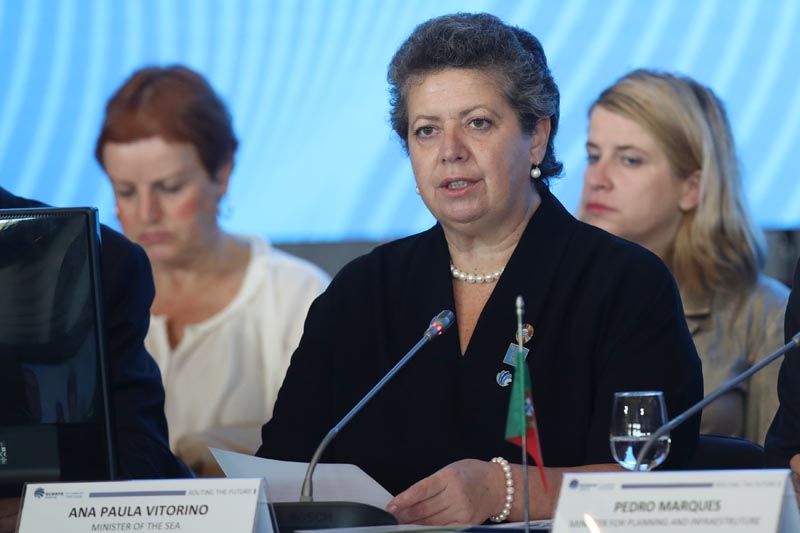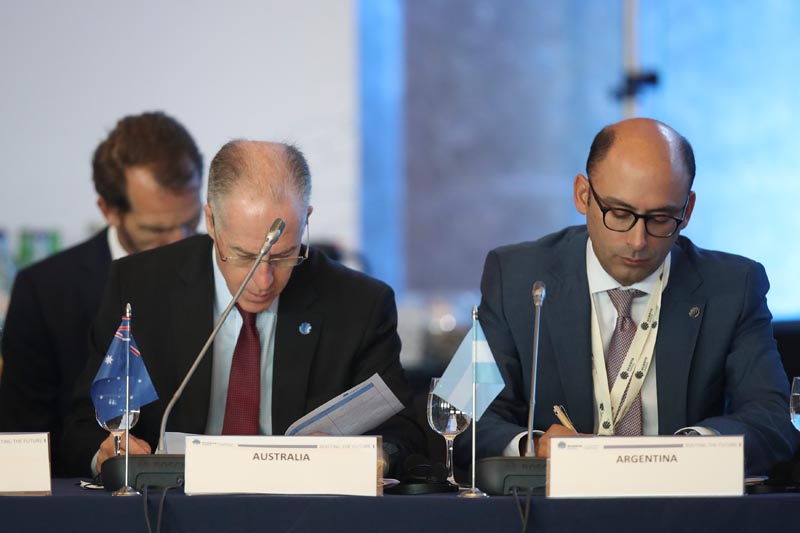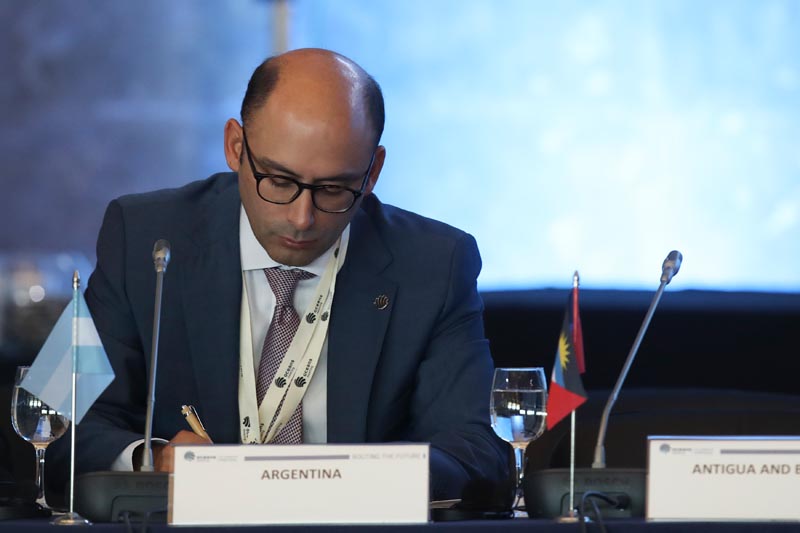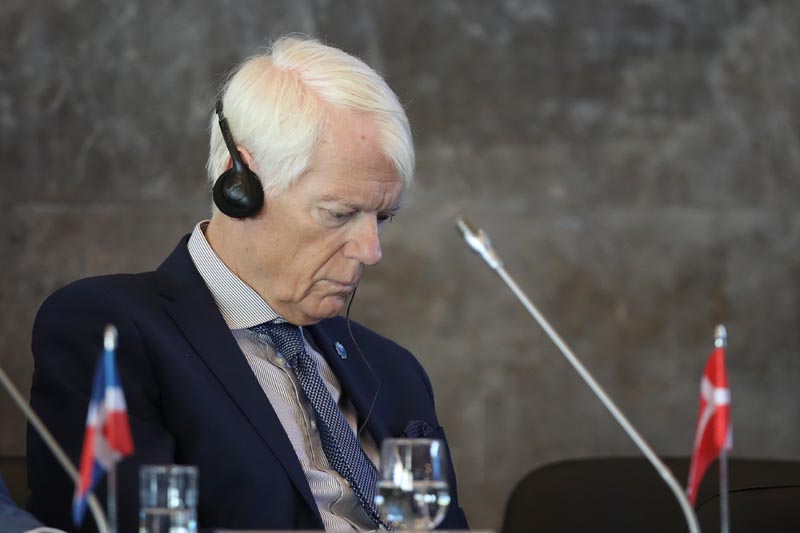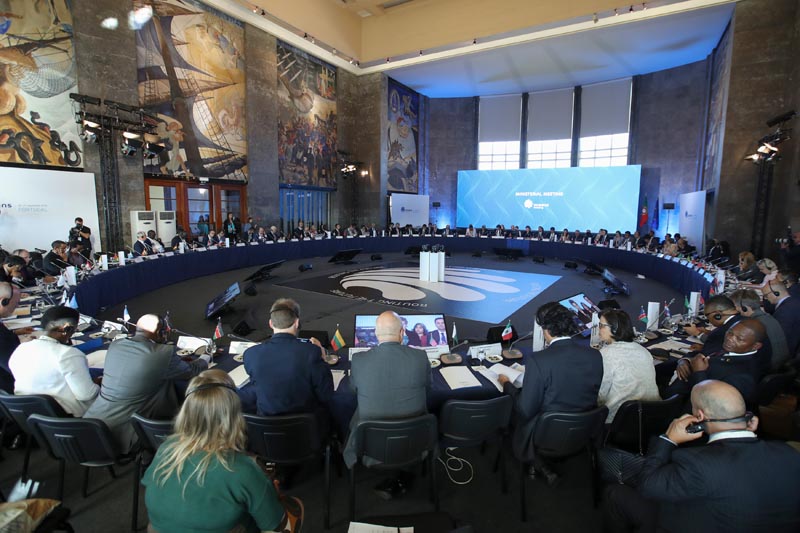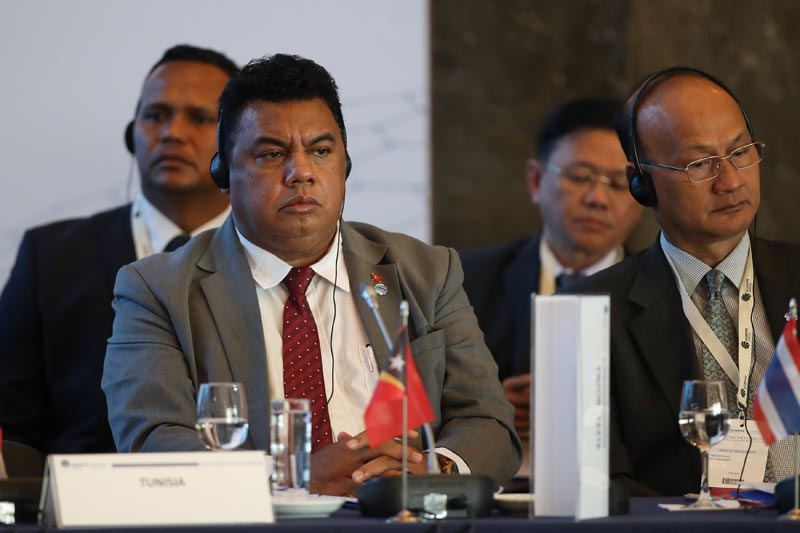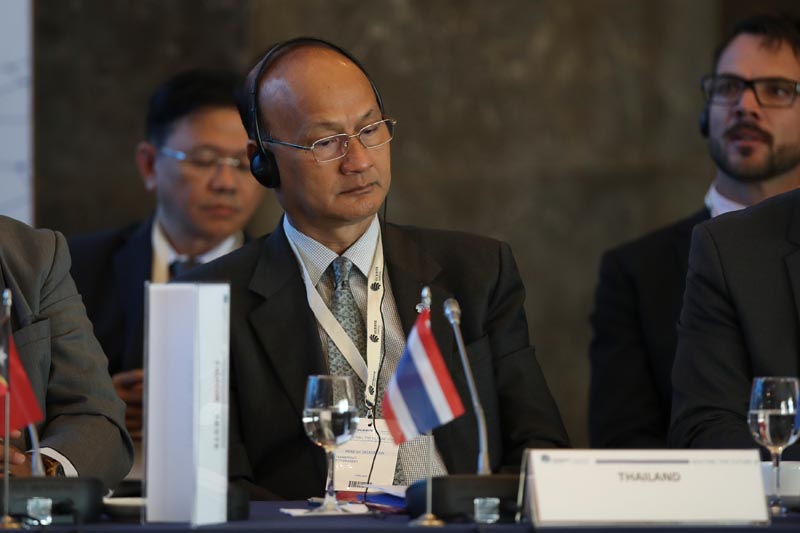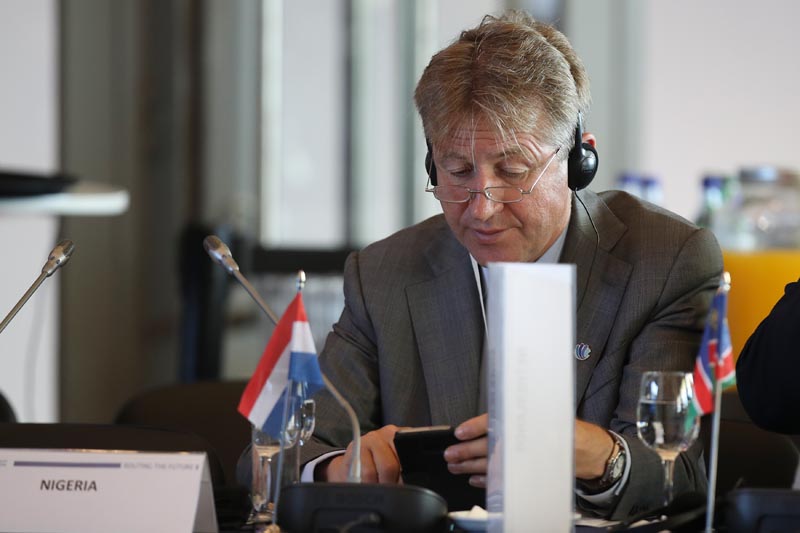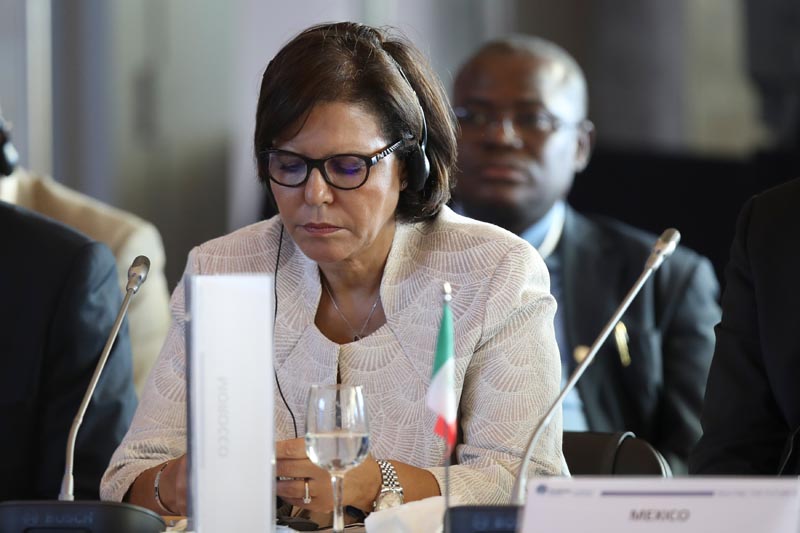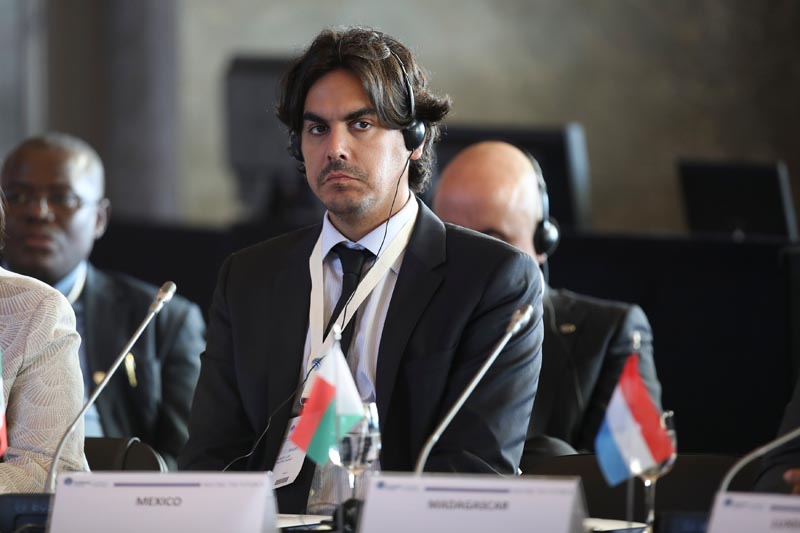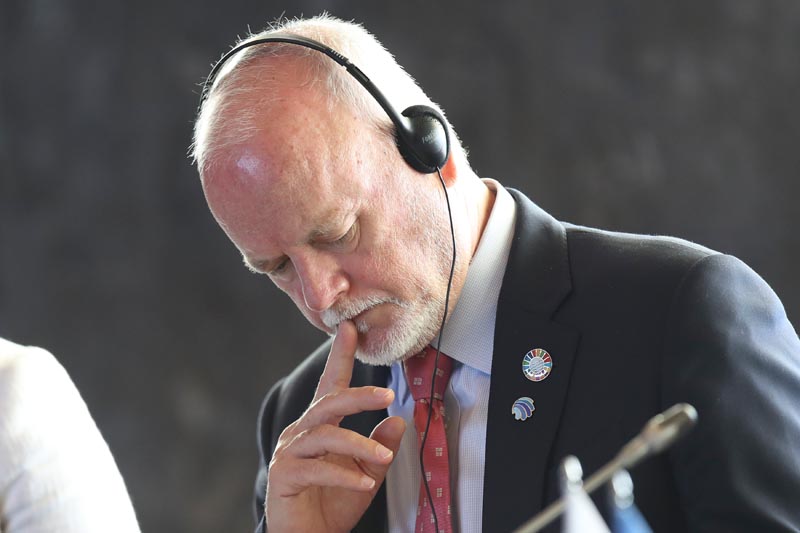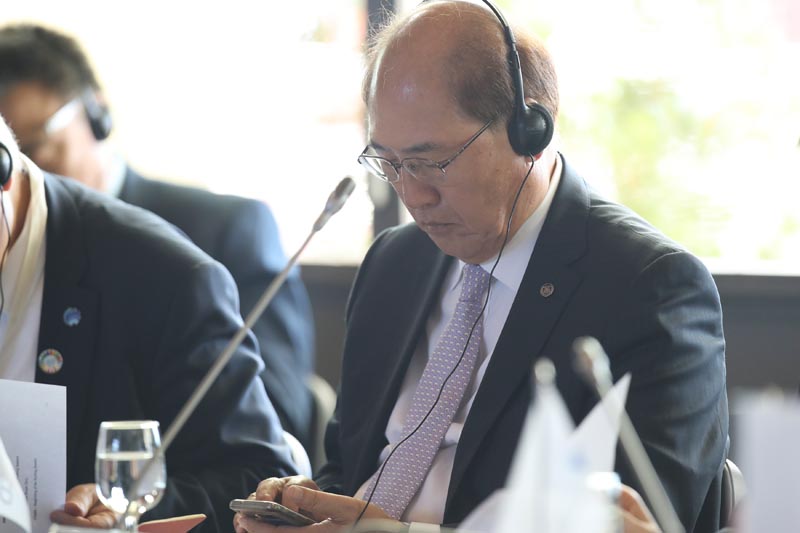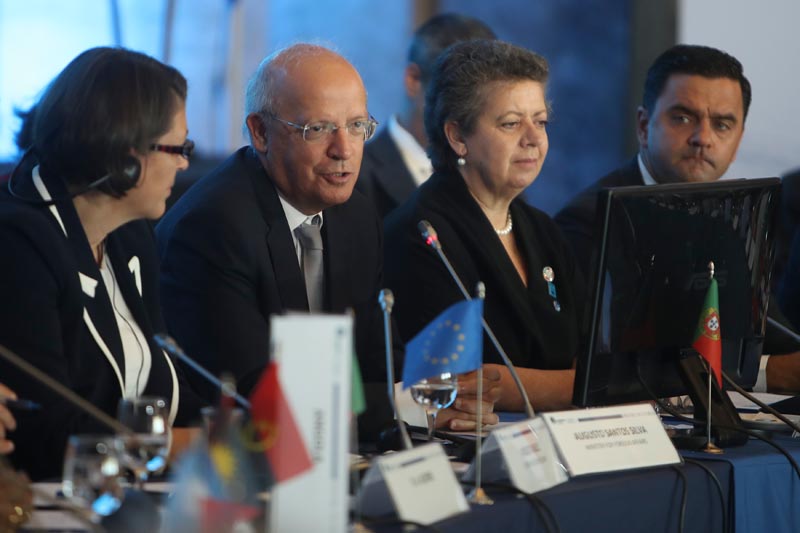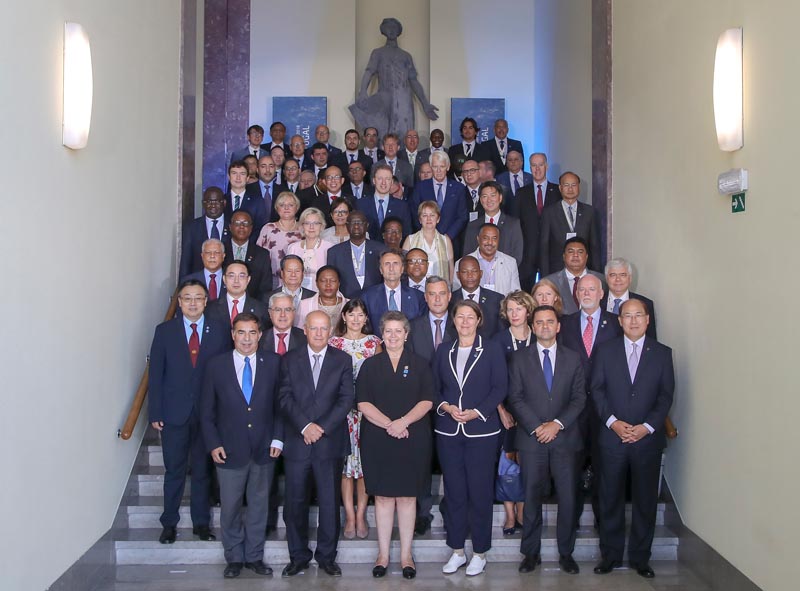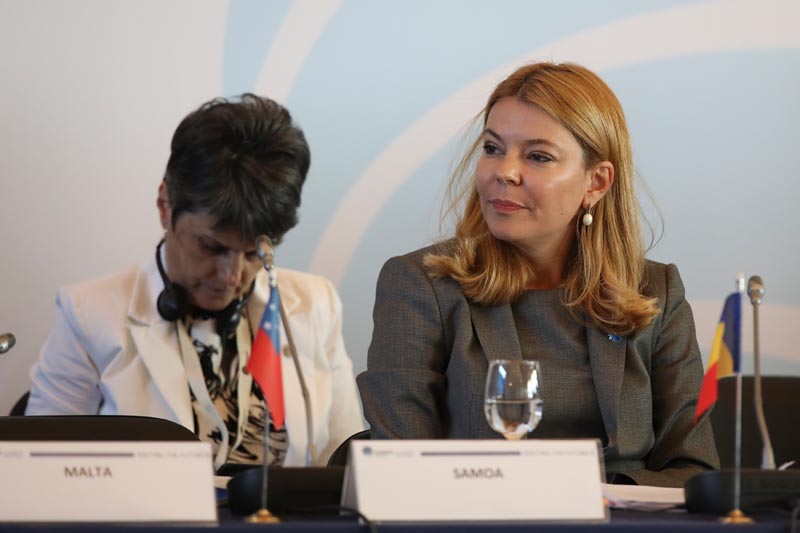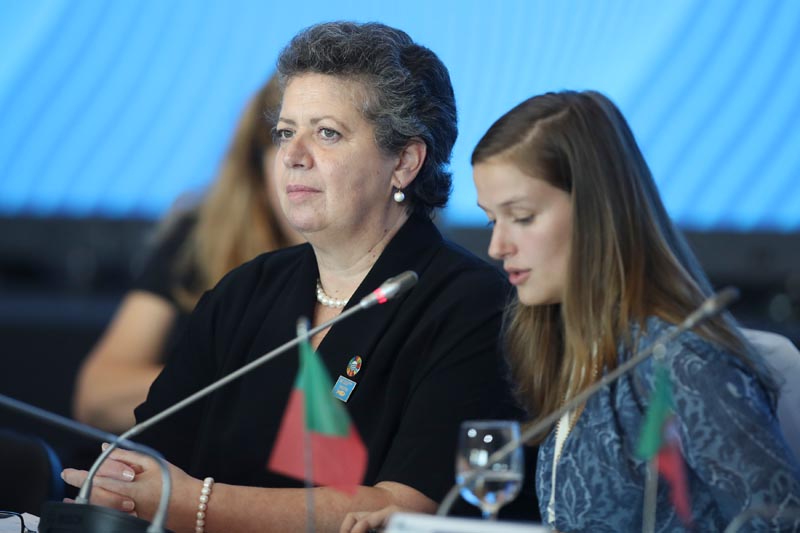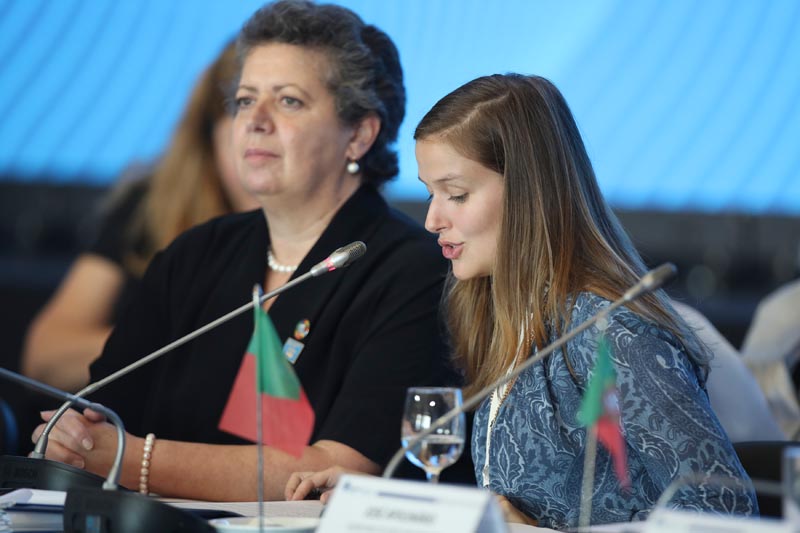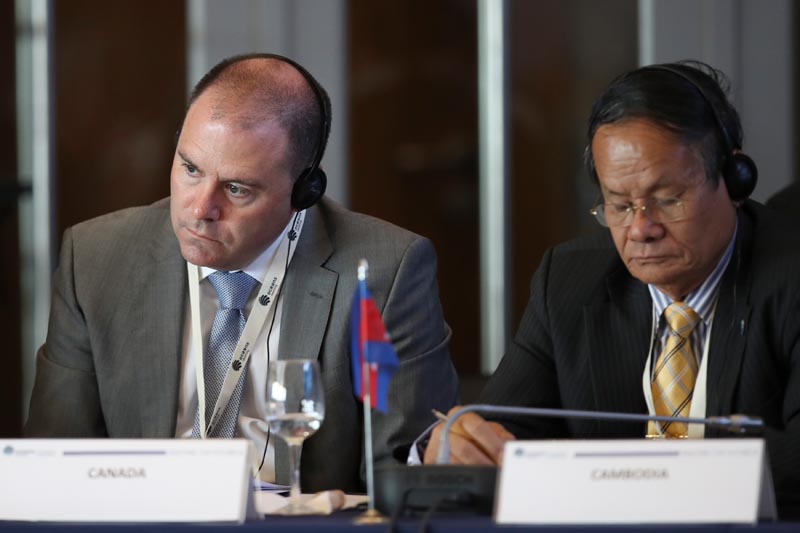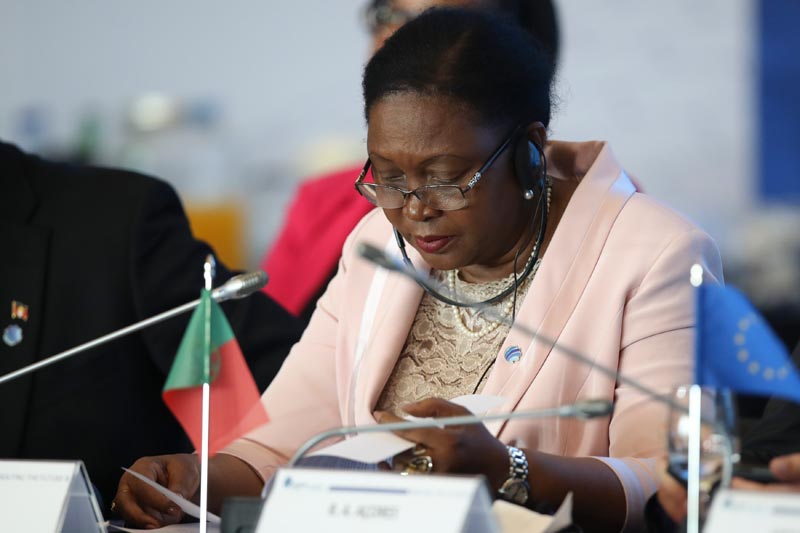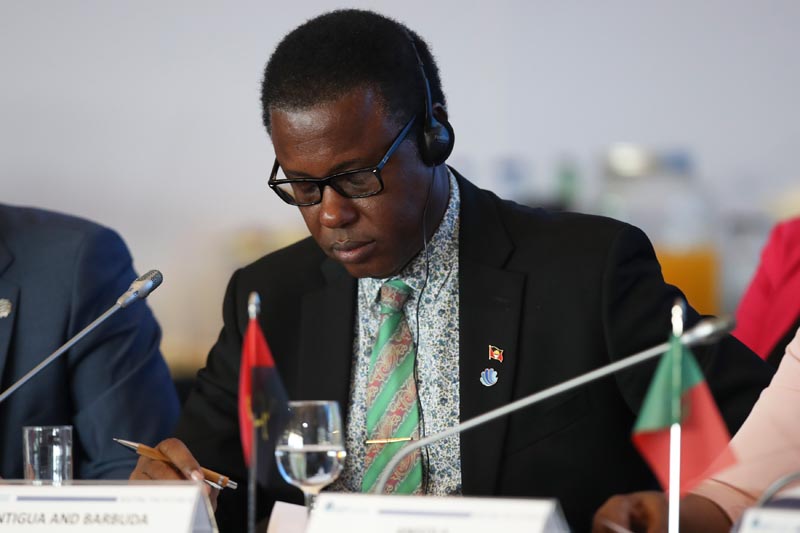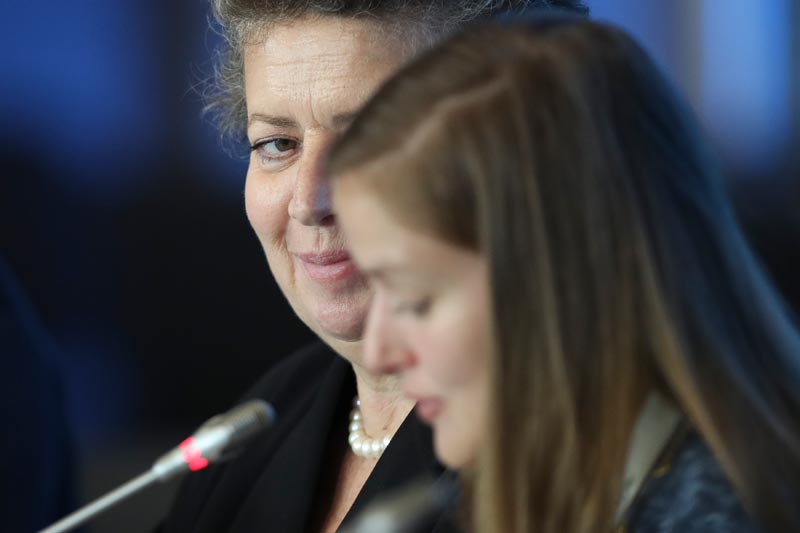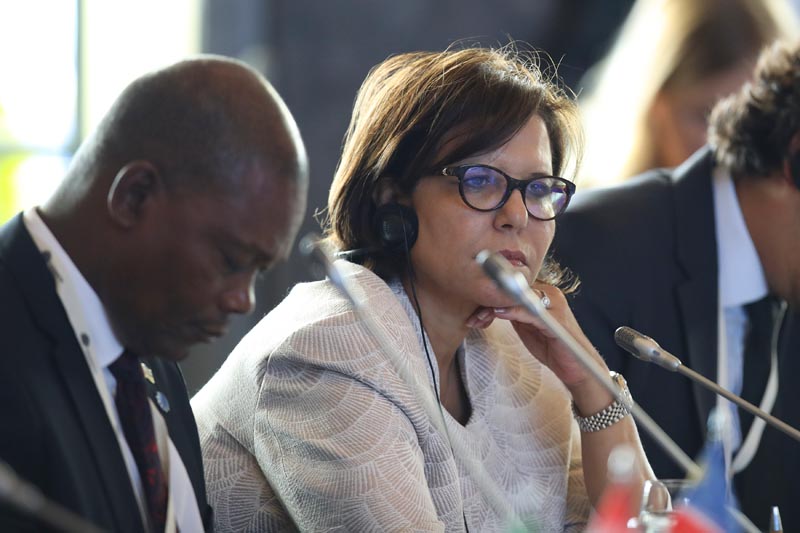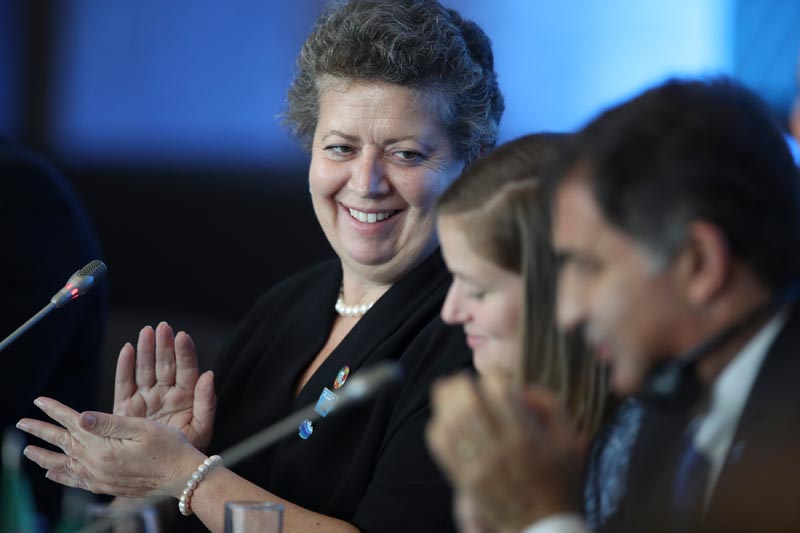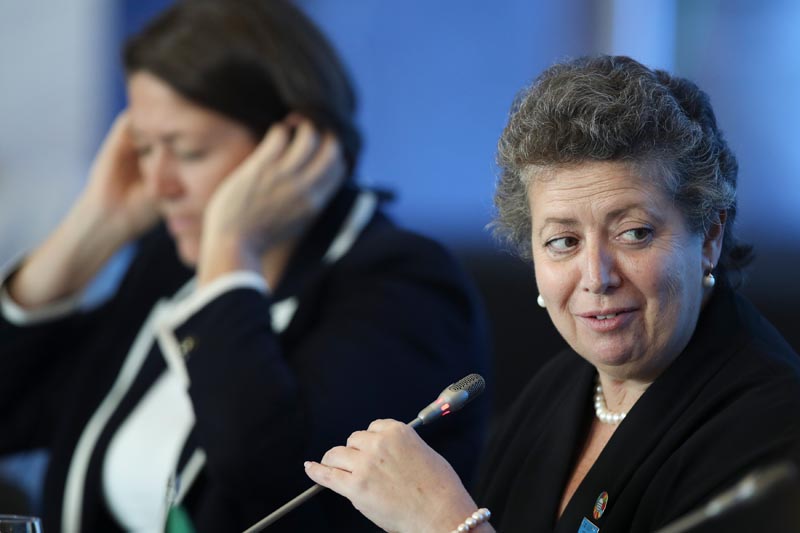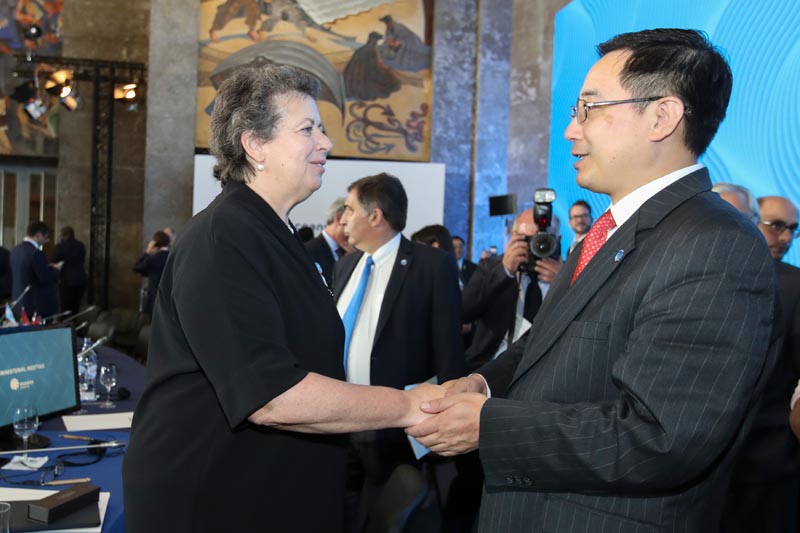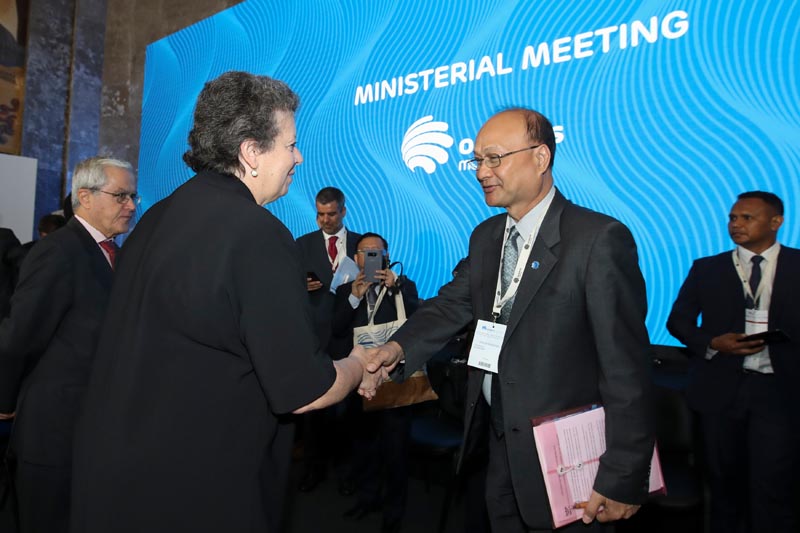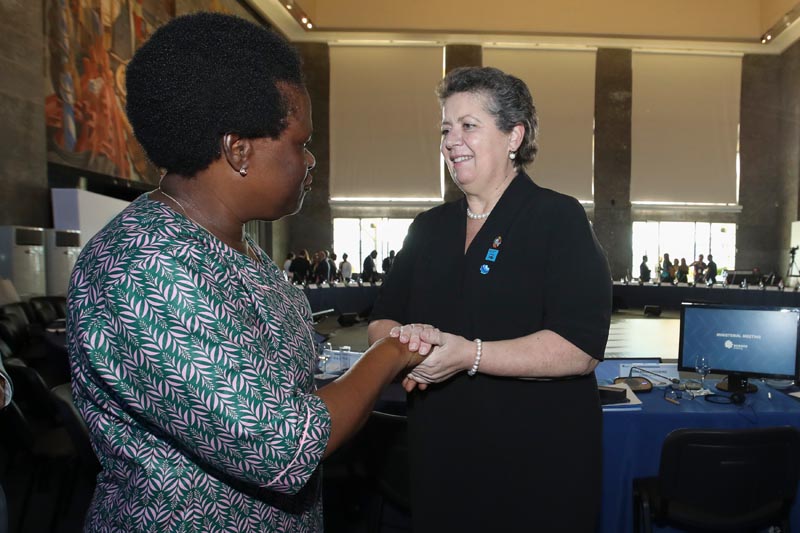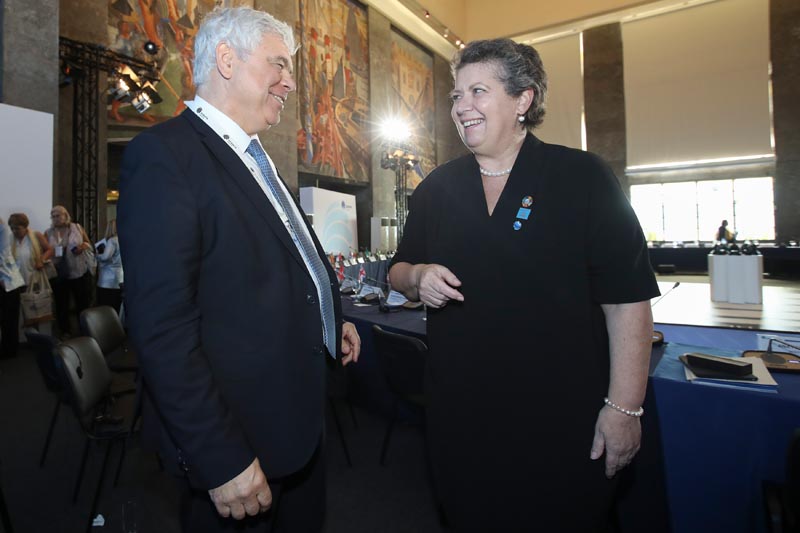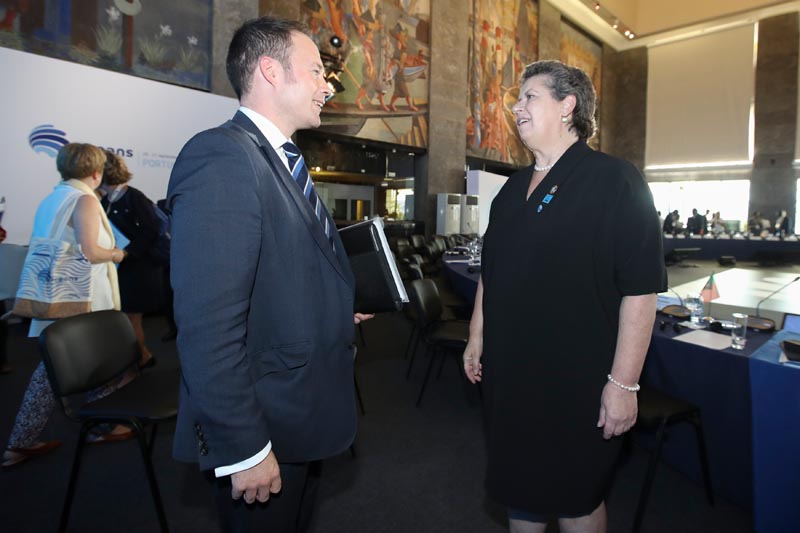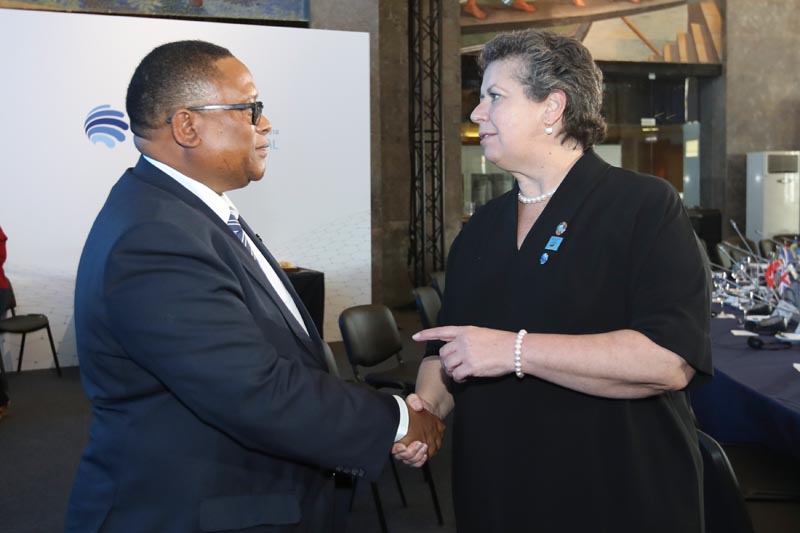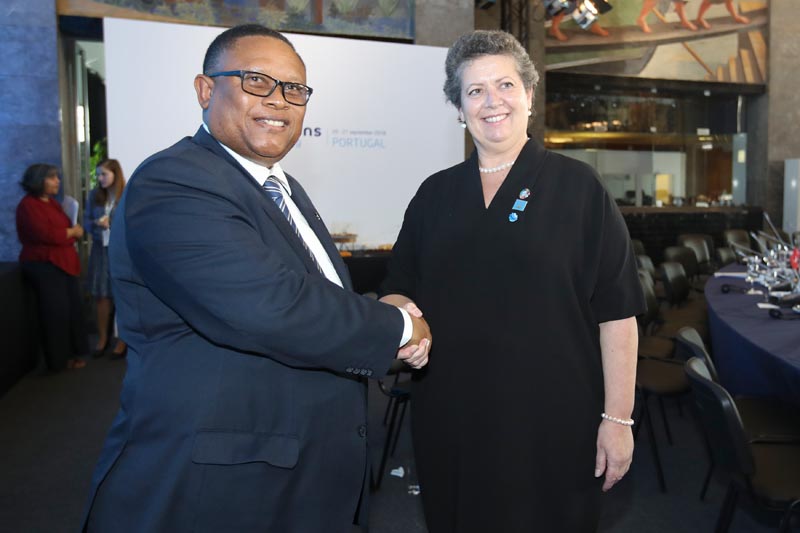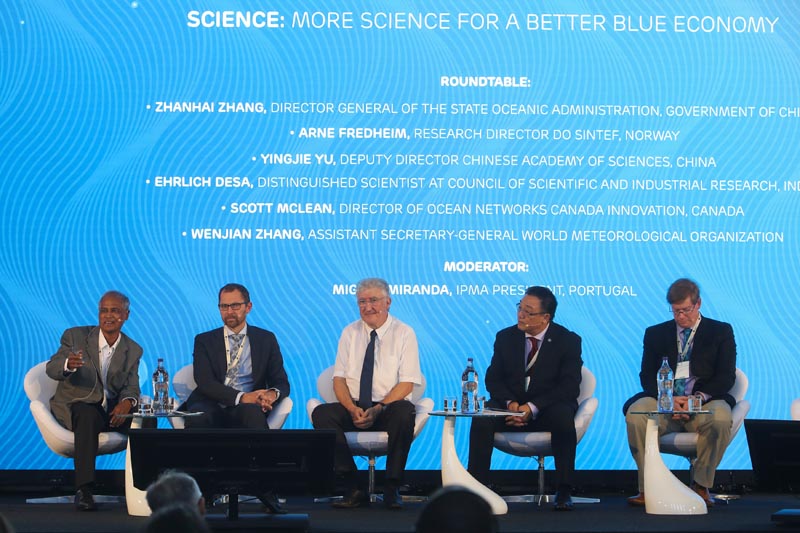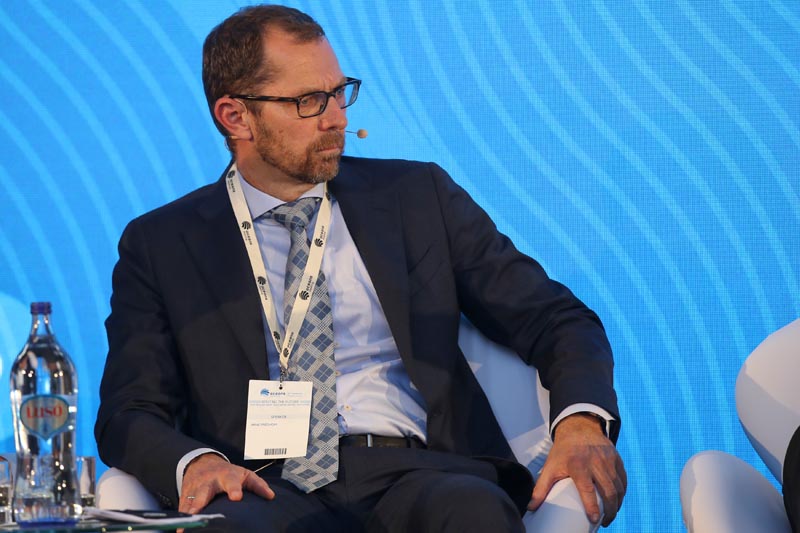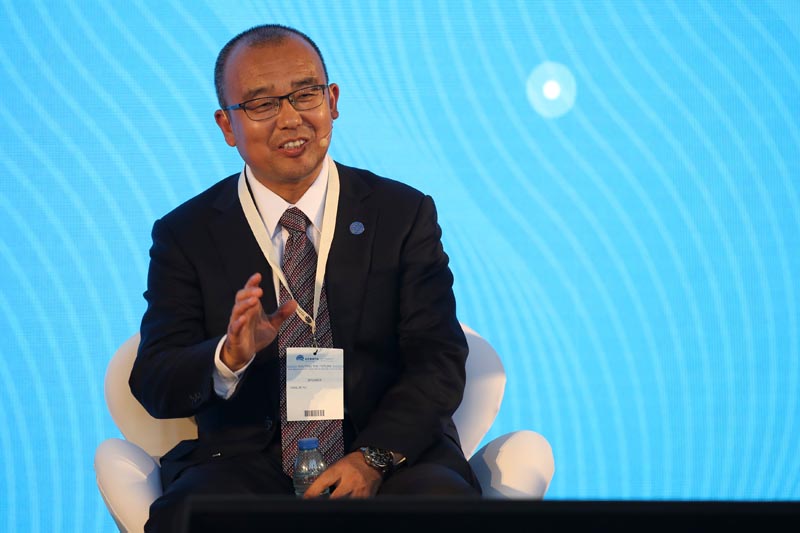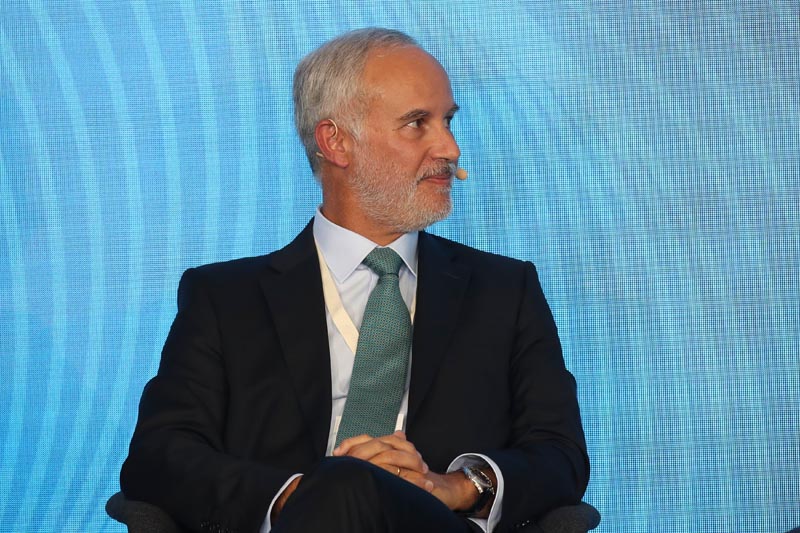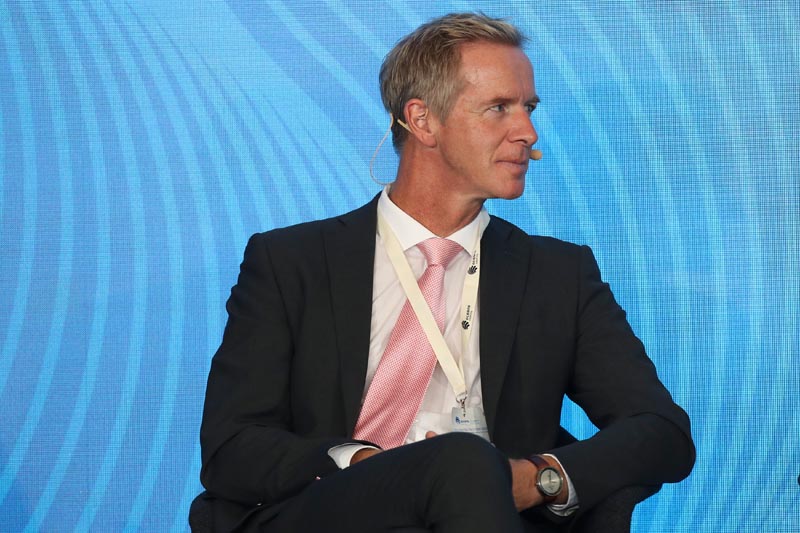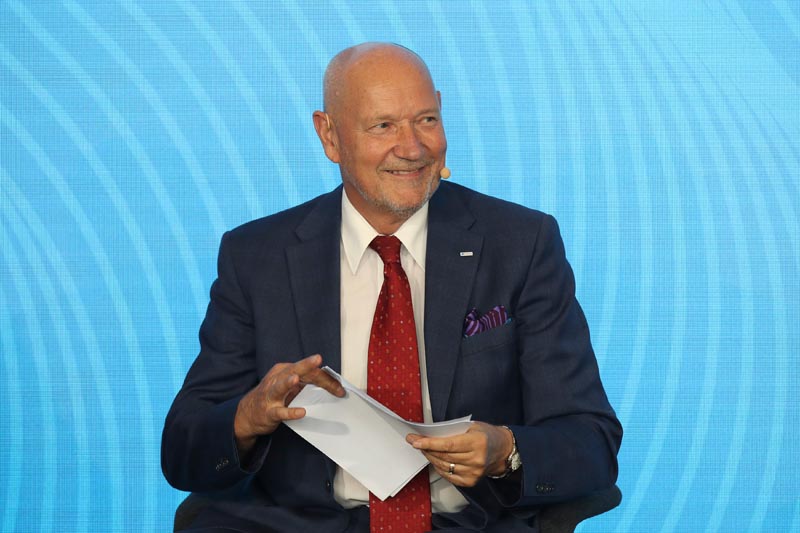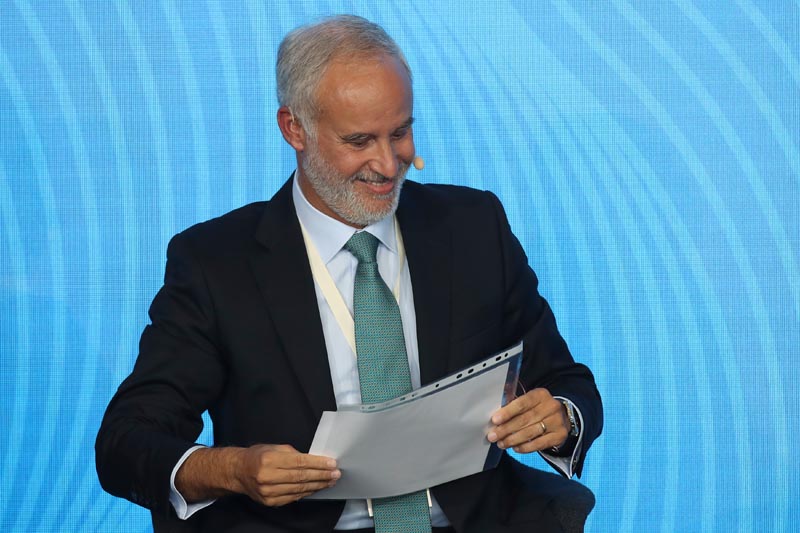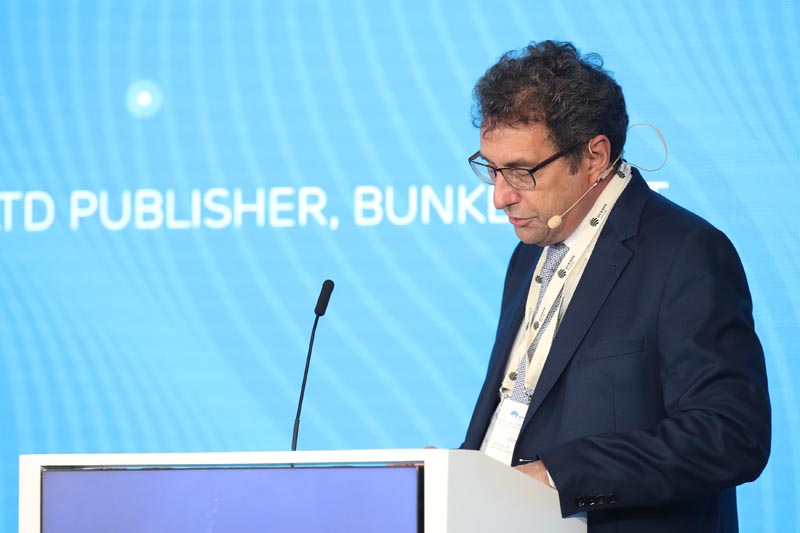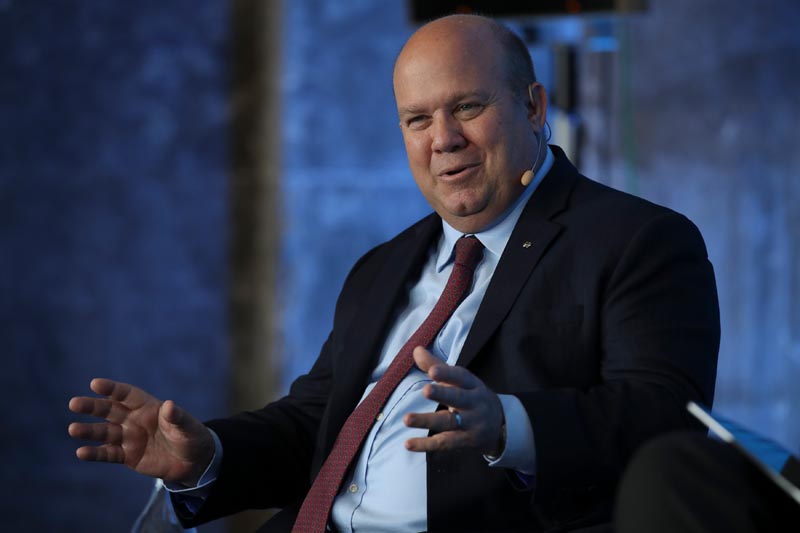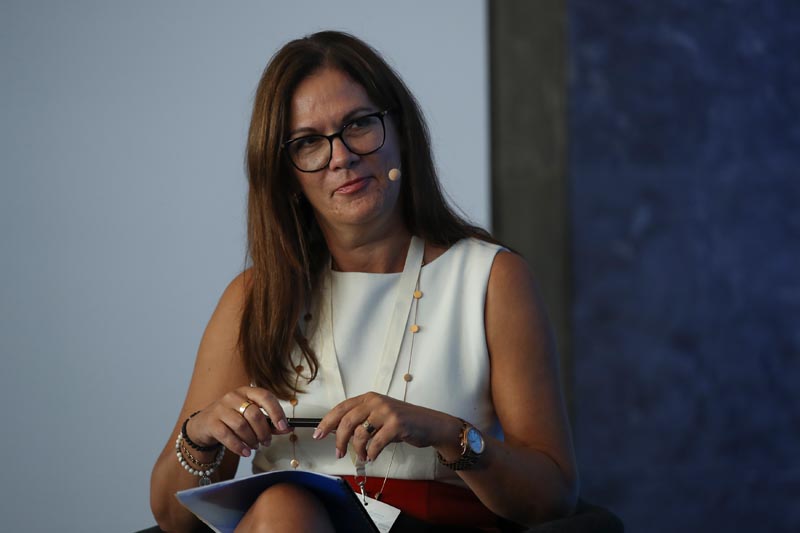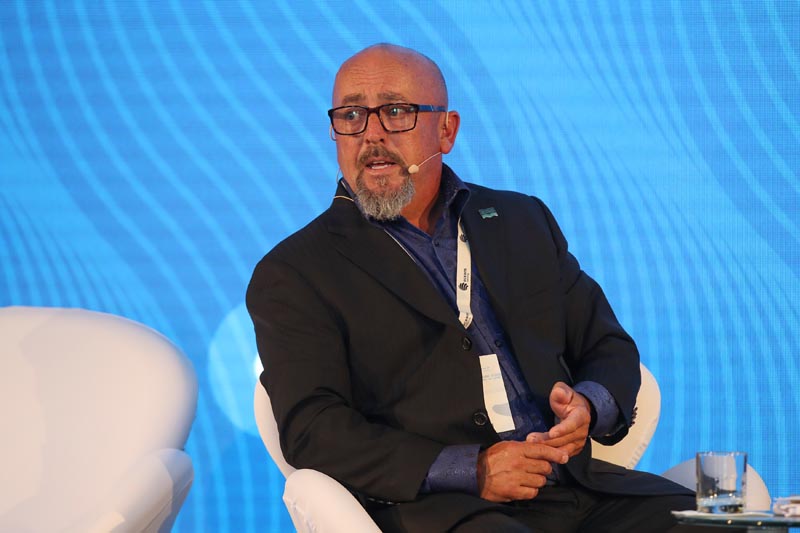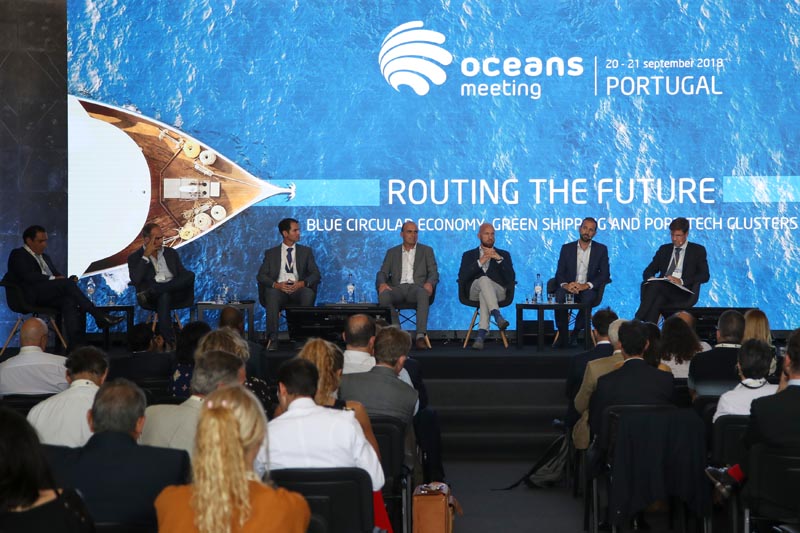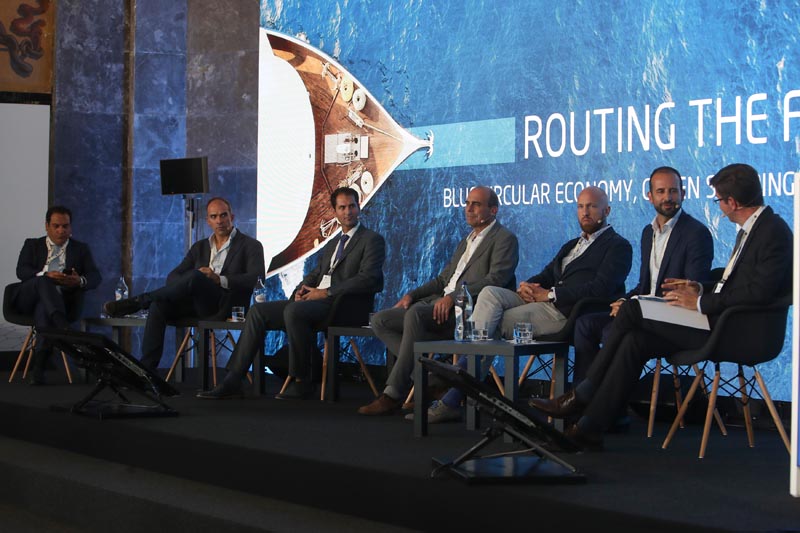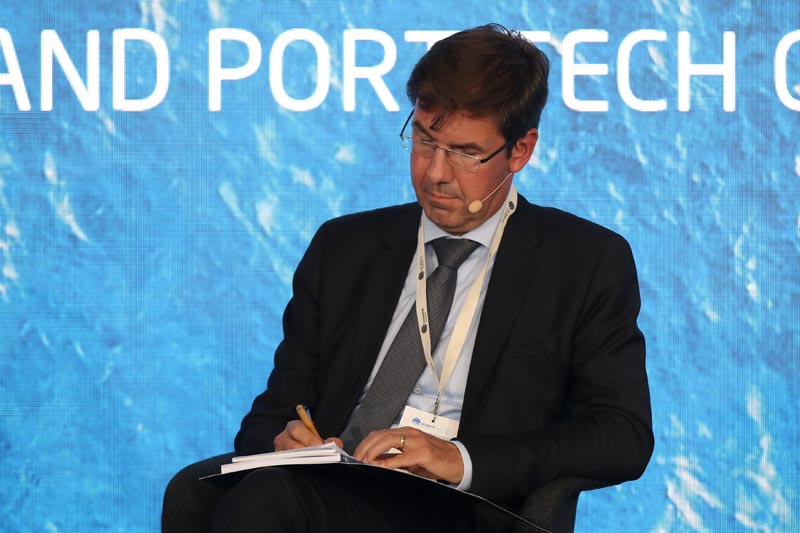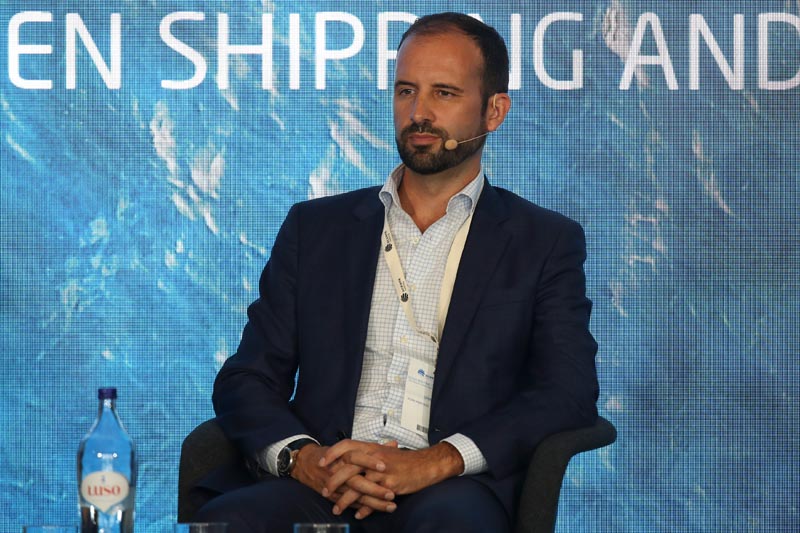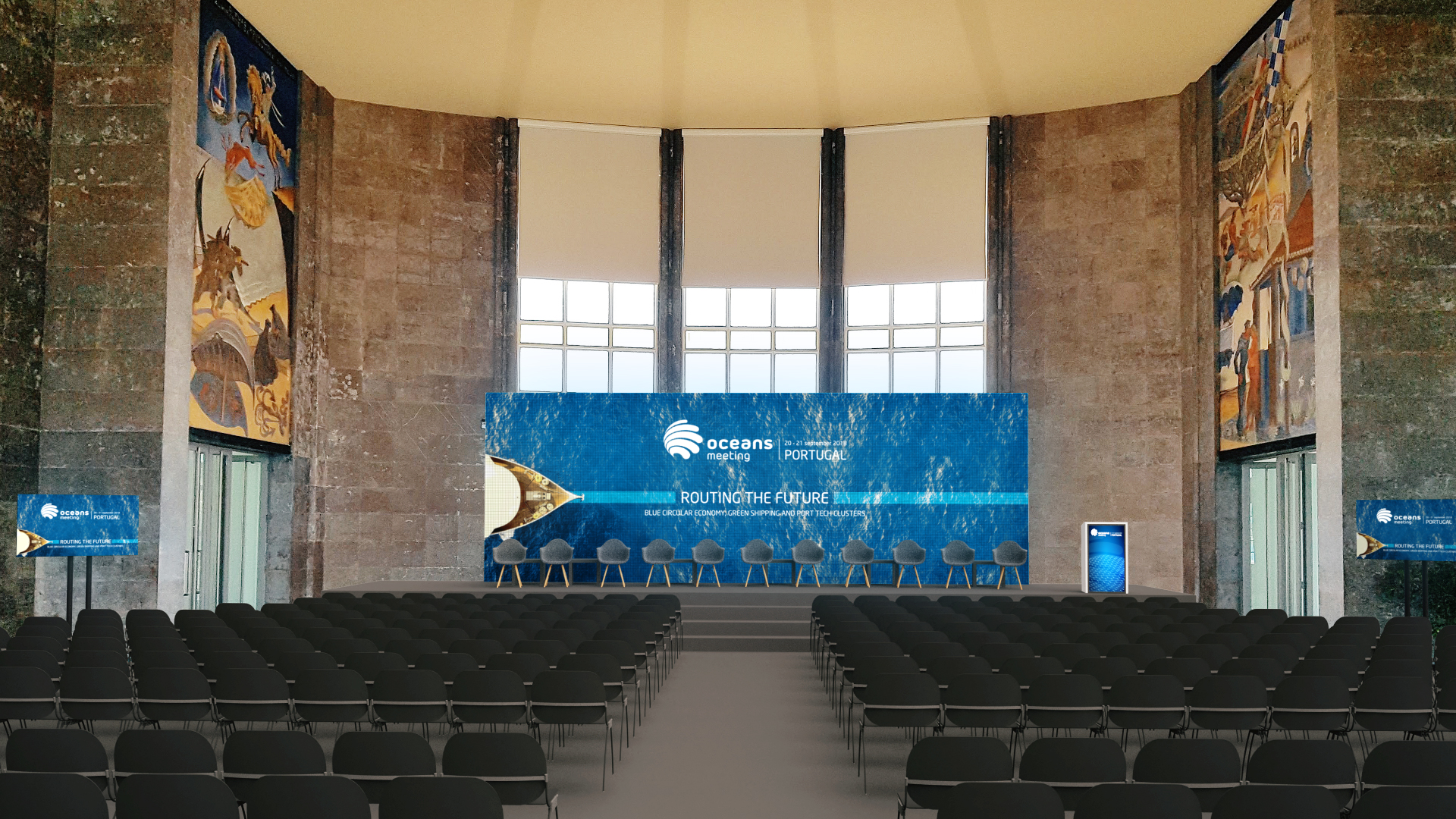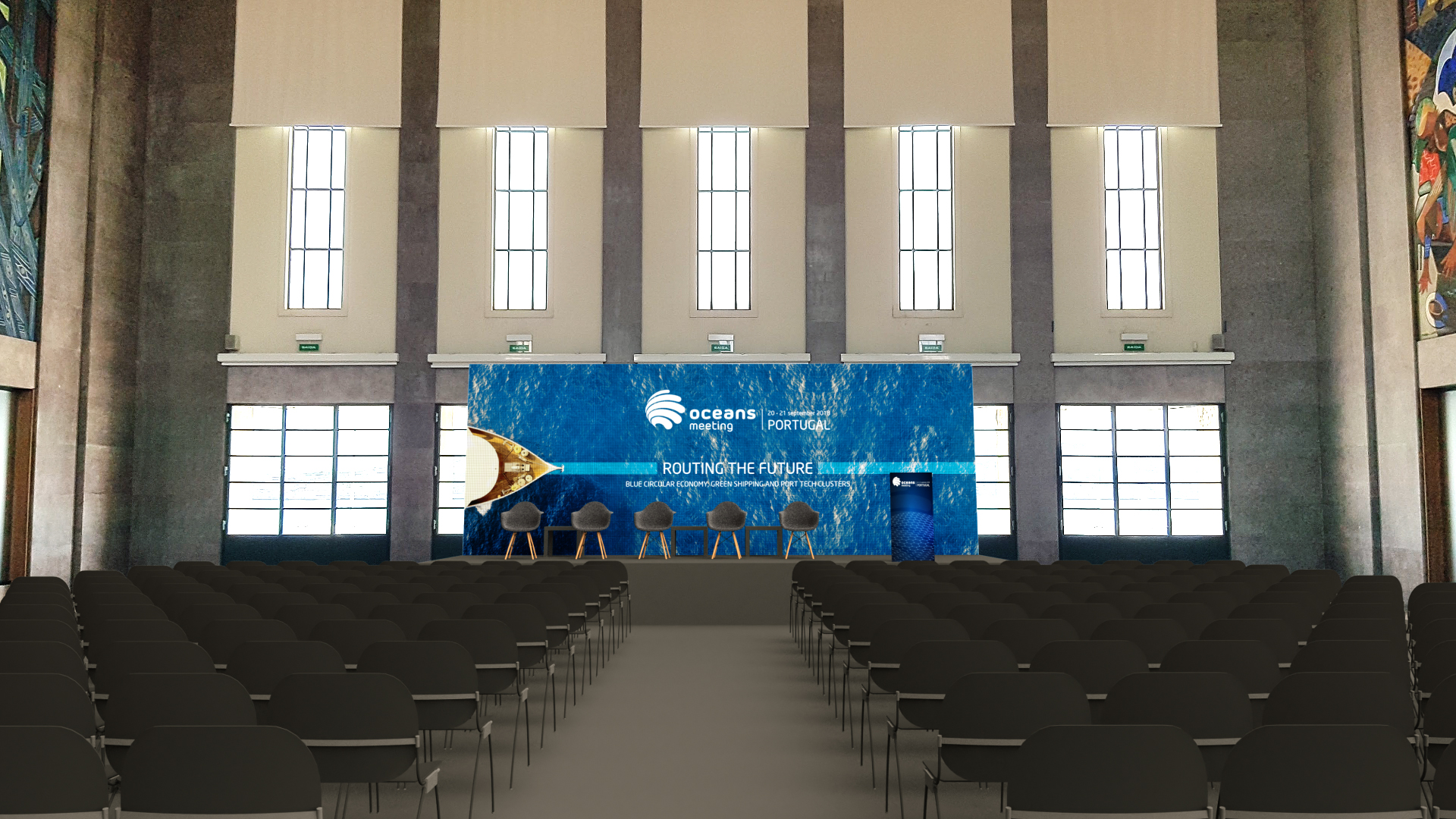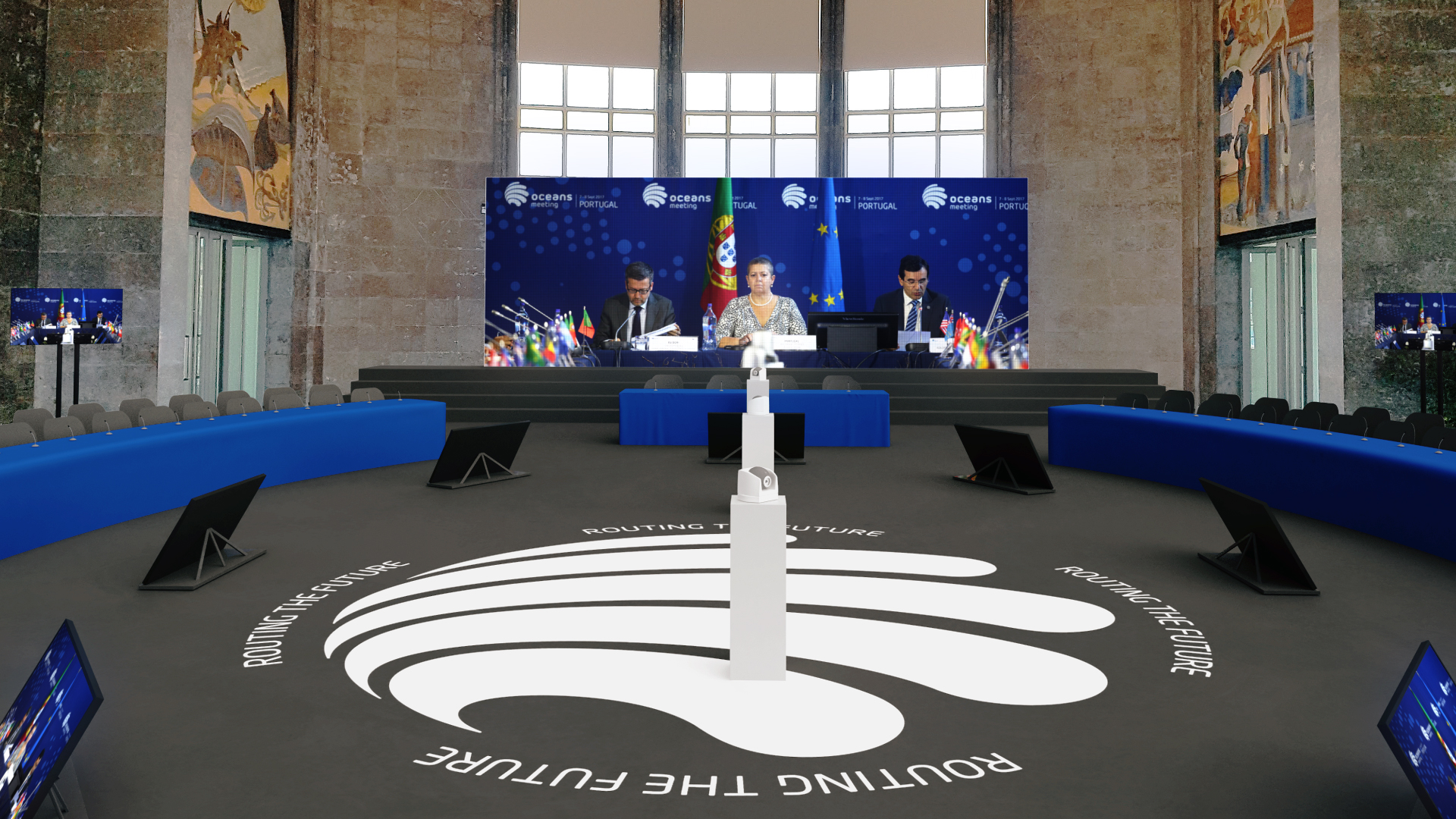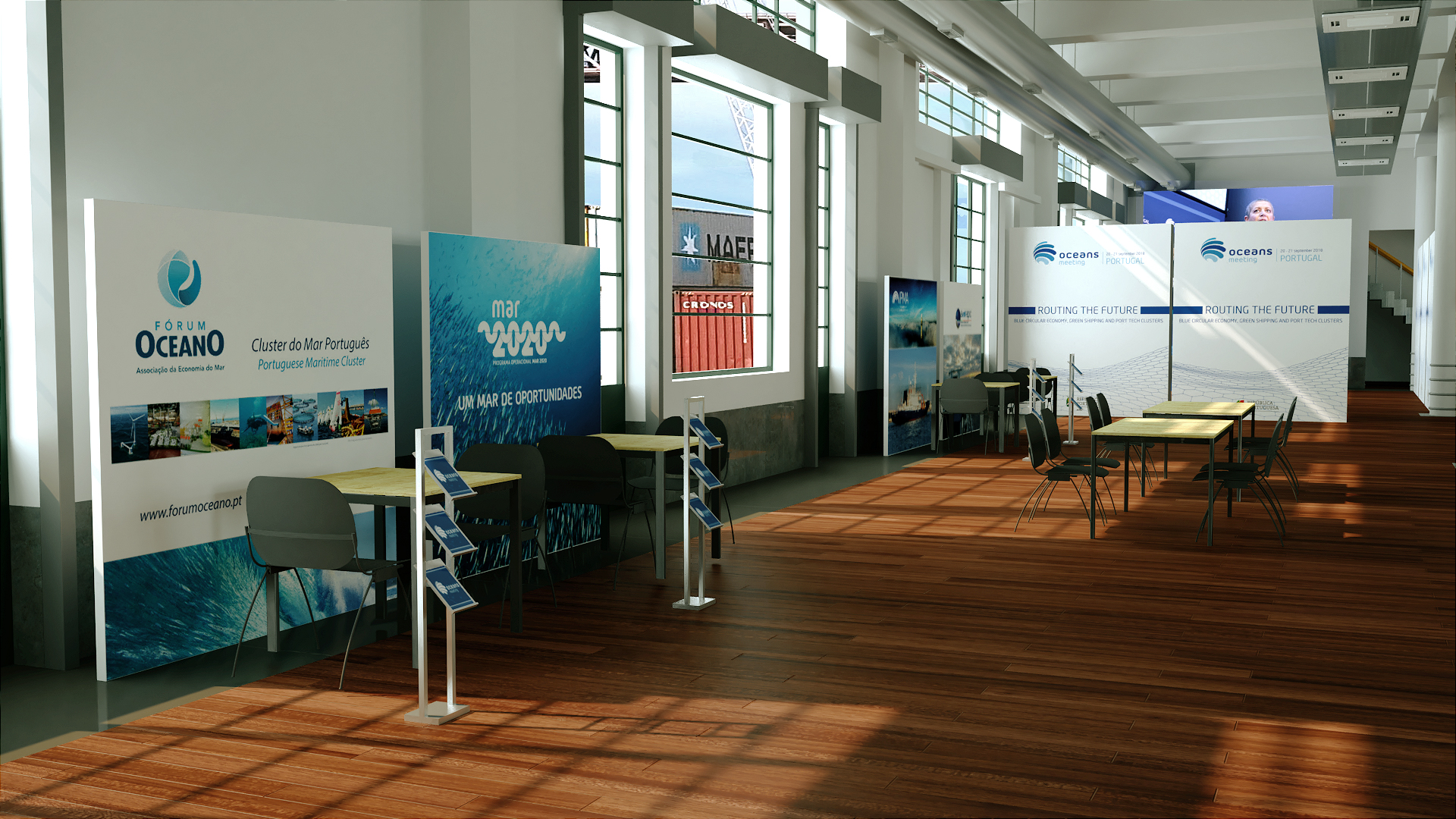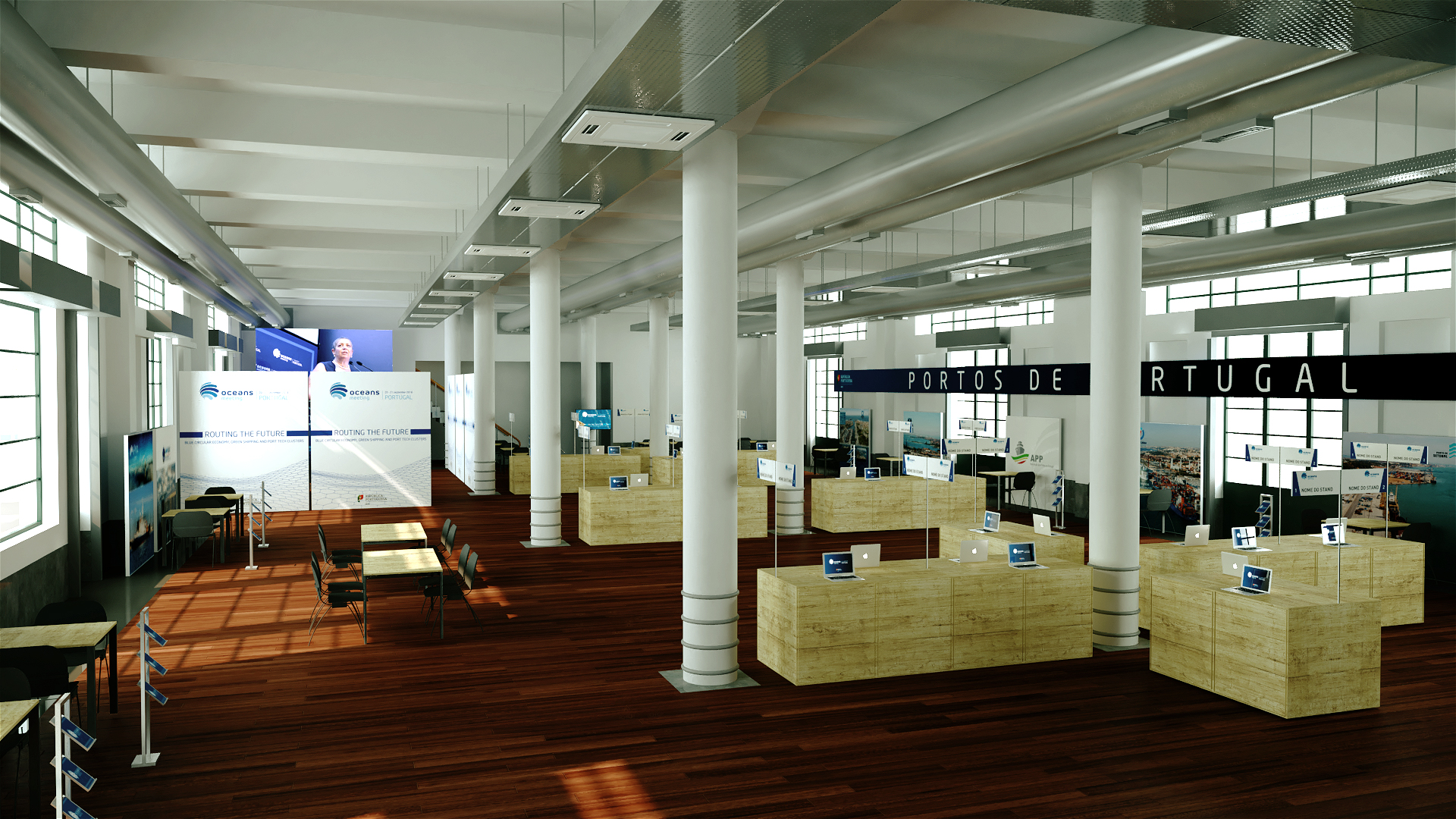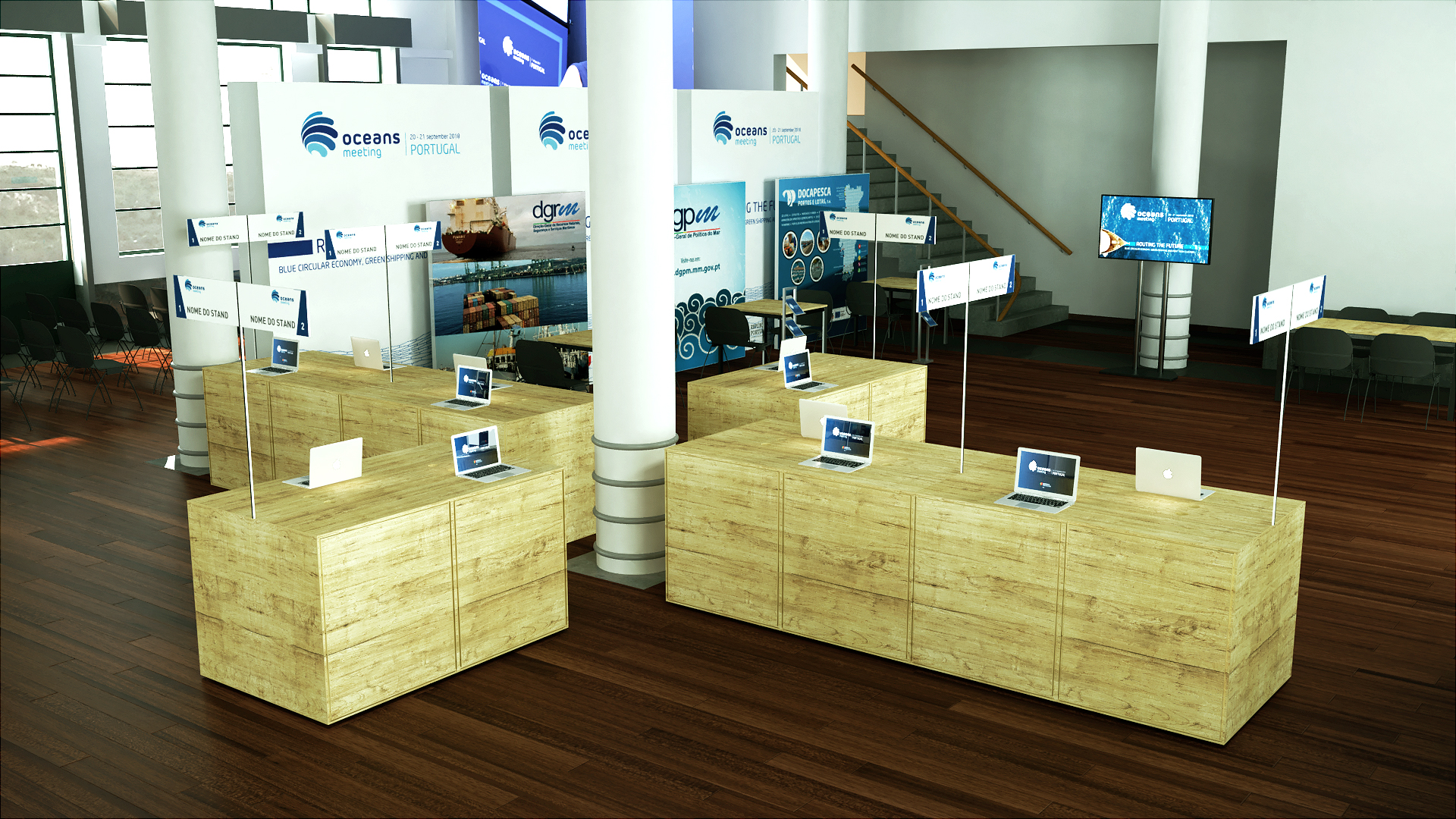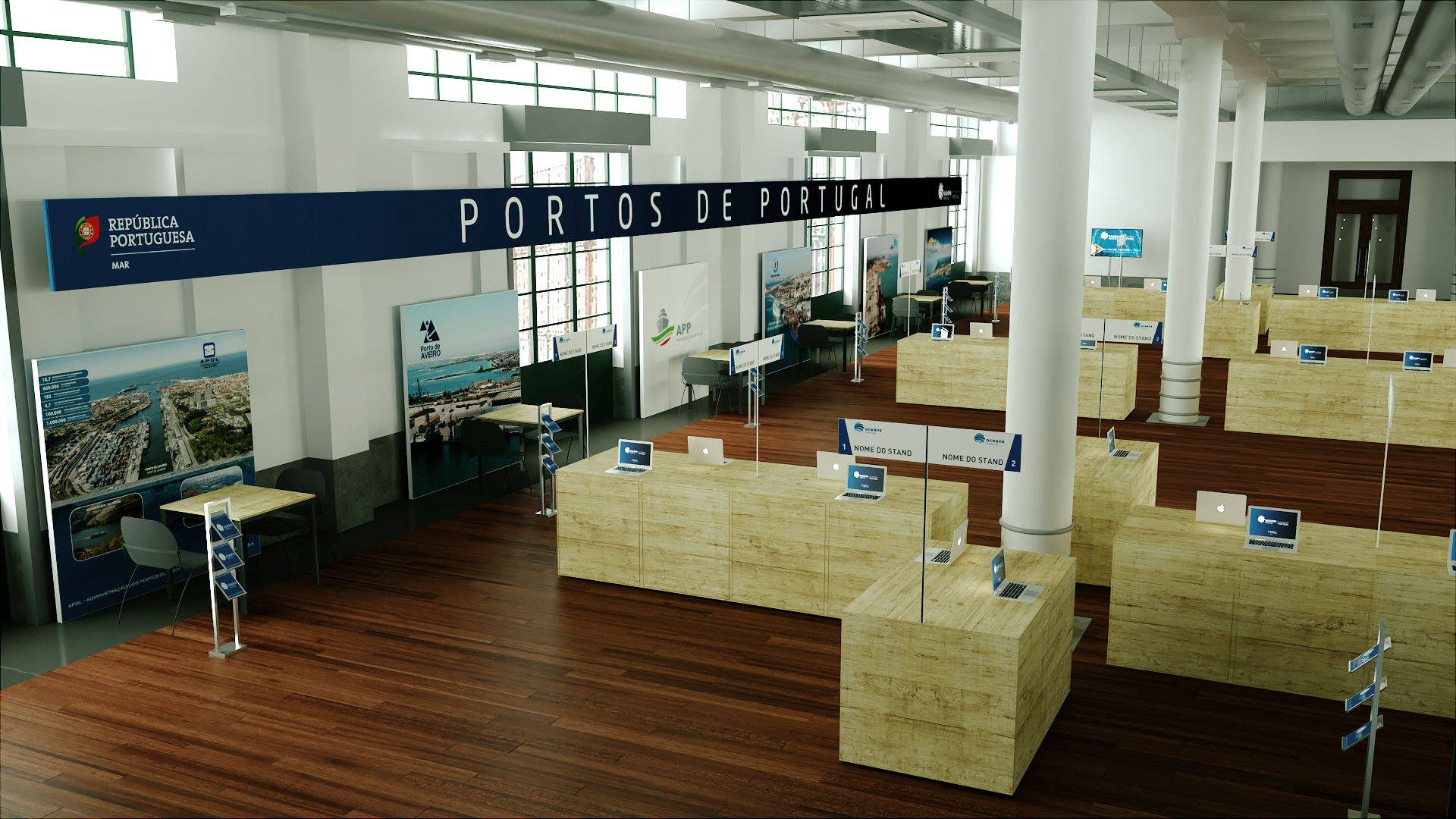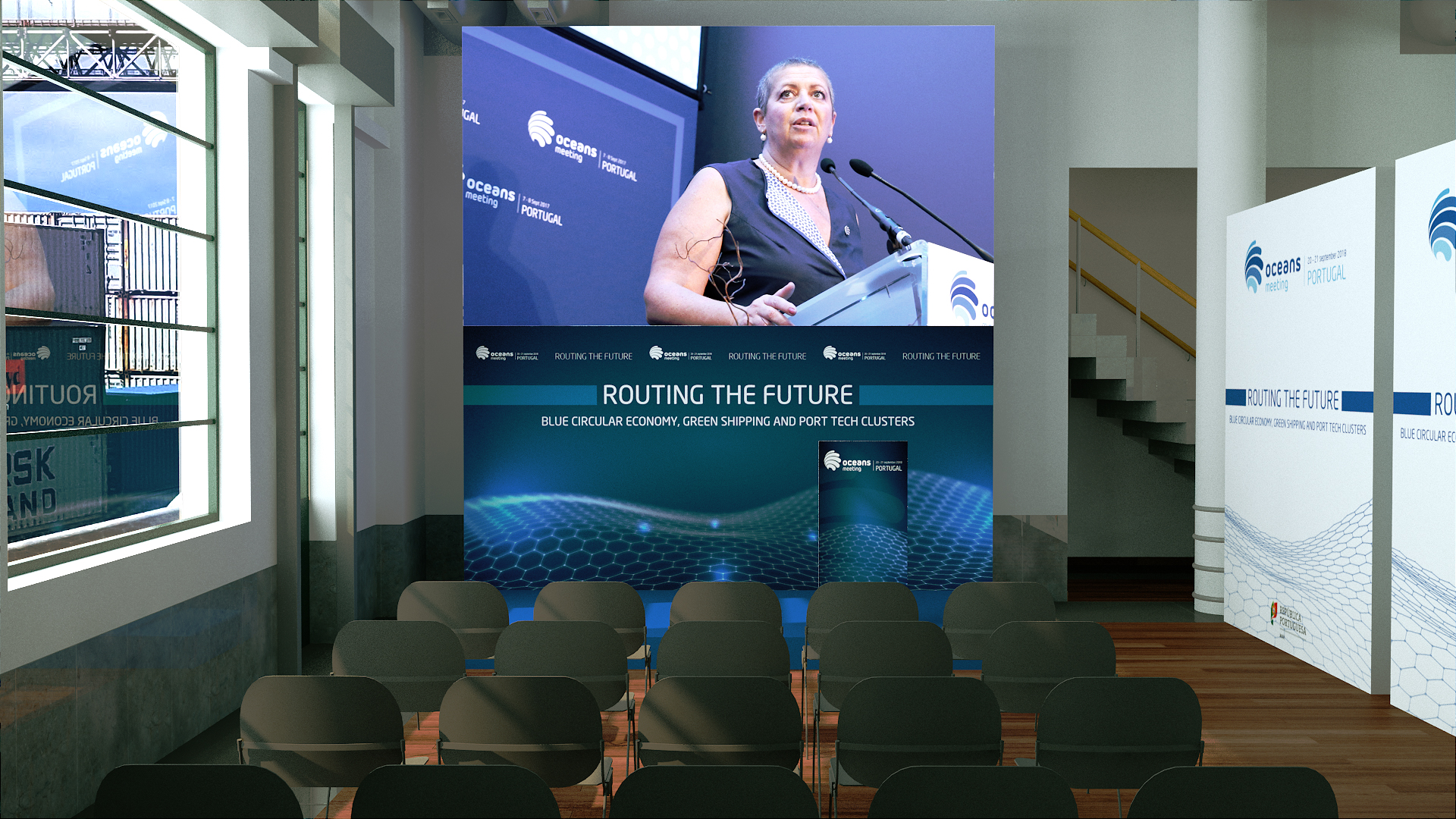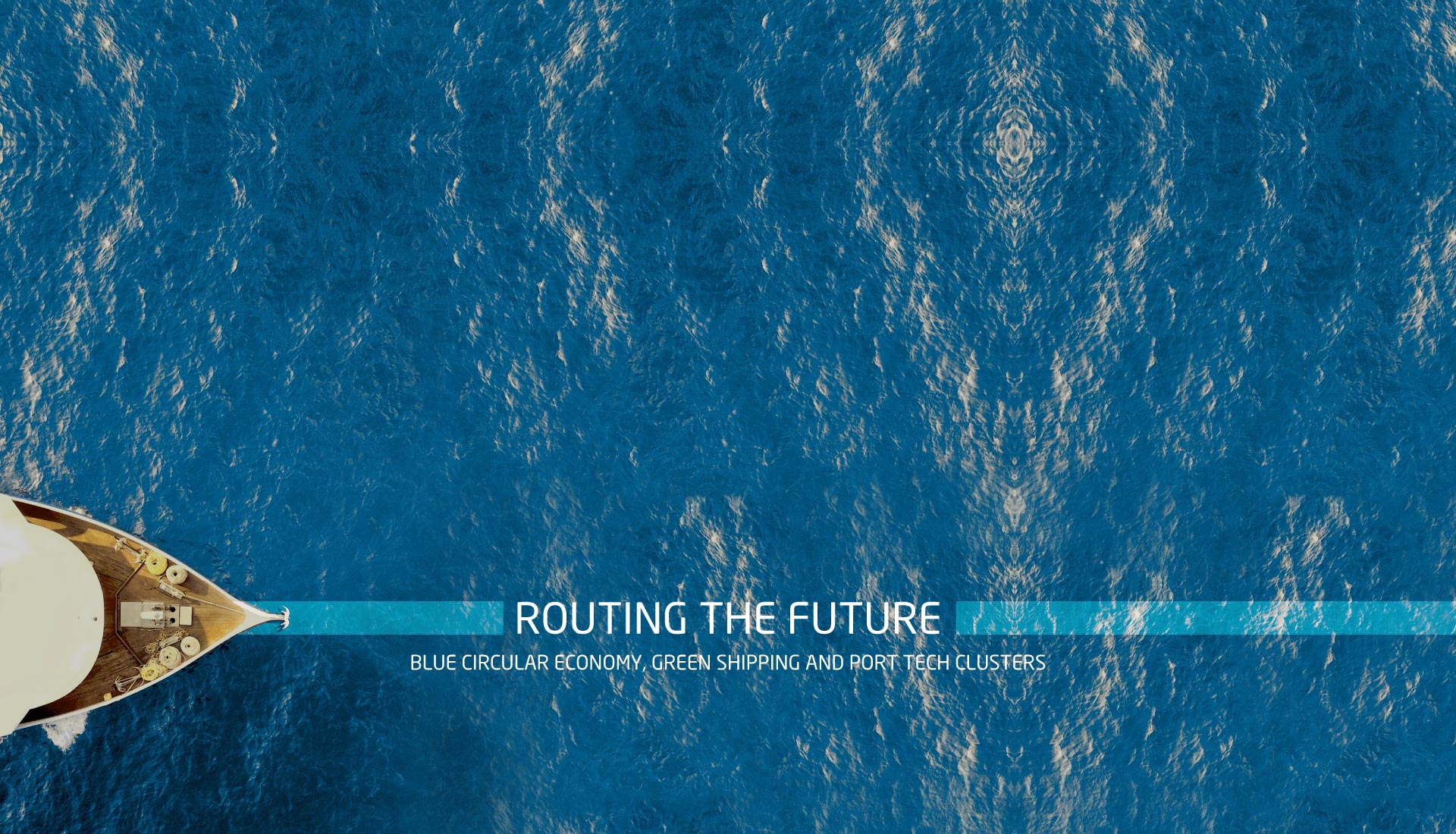

LISBON 20 – 21 SEPTEMBER 2018
MINISTERIAL MEETING OF THE OCEANS MEETING 2018
DECLARATION ON BLUE CIRCULAR ECONOMY, GREEN SHIPPING AND PORT TECH CLUSTERS
We, the Ministers responsible for Ocean, Shipping, Ports and Maritime Affairs and observers having met in Lisbon, on September the 21st, 2018, by invitation of the Portuguese Government through the Minister of the Sea of the Portuguese Republic, Mrs. Ana Paula Vitorino, in the framework of the Oceans Meeting 2018;
Recalling the declarations of the ministerial meetings of Oceans Meeting 2016 and 2017, held in Lisbon, in June 2016 and September 2017, promoting Human Health, Ocean Literacy & Culture, Ocean Science & Innovation and Blue Economy;
Reaffirming that the United Nations Convention on the Law of the Sea is of strategic importance as the basis for national, regional and global action and cooperation in the ocean and maritime sector;
Acknowledging that the ocean covers 71% of Earth’s surface, that it contains more than 90% of the planet’s biodiversity, that over 80% of the world’s trade is made by sea and that the ocean is a fundamental regulator of the global climate;
Recognizing that the effects of the cumulative pressures that the ocean is experiencing, such as biodiversity loss, pollution, climate change and acidification, and other emerging challenges such as marine litter, or underwater noise, threaten the resilience of the oceans as well as the ecosystem services that marine ecosystems provide to human beings, and thus in the end, compromise the potential for a Sustainable Blue Economy, as one of the various approaches to sustainable development;
Further recognizing that we are highly dependent on the ocean, and that the ocean and its resources are indispensable to the achievement of the Sustainable Development Goals (SDG) as defined in the 2030 Agenda for Sustainable Development adopted at the United Nations General Assembly, on 25 September 2015;
Reaffirming that Sustainable Blue Economy has the potential to shape the way of doing business with zero pollution caused by waste and low emissions, providing a sustainable and competitive business framework – based on innovations that can help us attain economic, social and environmental benefits;
Welcoming, in this regard, the Call for Action of the United Nations Ocean Conference, held in New York, from 5 to 9 June 2017, to support the Implementation of SDG 14 and the commitment made by the Portuguese Republic to co-host, with the Republic of Kenya, the next UN Ocean Conference, to take place in Portugal, in 2020;
Recalling the purpose of the UN Decade of Ocean Science for Sustainable Development (2021-2030) to ensure ocean science can support countries in creating improved conditions for sustainable development of the Ocean;
Acknowledging that scientific knowledge of the ocean and its biodiversity is an important prerequisite for the conservation and sustainable use of marine biodiversity and that, therefore, ocean observation is essential, including data collection, mapping, modelling and assessment of marine biodiversity and its ecosystem services;
Recalling the adoption and early entry into force of the Paris Agreement negotiated under the United Nations Framework Convention on Climate Change (UNFCCC), while recognizing the importance of building awareness and knowledge on the adverse impacts of climate change on the Ocean, particularly in the marine environment, marine biodiversity and sea level rise;
Noting, in this regard, that the ocean has now absorbed about a third of anthropogenic CO2 emitted into the atmosphere since the beginning of the Industrial Revolution, and that the continual absorption of CO2 increases acidity levels, combined with the warming of the oceans, will greatly impact the capacity of our seas to sustain the level and quality of ecosystem services it provides;
Welcoming the adoption of United Nations General Assembly resolution 72/249, of 24 December 2017 convening an intergovernmental conference to elaborate the text of an International legally binding instrument under the UNCLOS on the conservation and sustainable use of marine biological diversity of areas beyond national jurisdiction with a view to developing the instrument as soon as possible;
Acknowledging the vital role of the International Maritime Organization (IMO) as the global standard setting authority of international shipping and the promotion of “safe, secure, environmentally sound, efficient and sustainable shipping through cooperation”;
Recognizing, in this regard, the IMO’s progress in the adoption of the initial IMO strategy on the reduction of greenhouse gas emissions from ships, including the aim to reduce the total annual greenhouse gas emissions from international shipping, by at least 50% by 2050, aiming to phase such emissions out as soon as possible in this century;
Also recalling the entry into force of the International Convention for the Control and Management of Ships’ Ballast Water and Sediments 2004, on the 8th September 2017 as well as IMO’s continuous efforts to address marine environment issues through the implementation of its relevant multi-lateral environmental instruments;
Recognizing the vital role of the ocean for sustainable development and the need for sustainable ocean-based economies including fisheries, tourism, aquaculture, maritime transportation, shipping, sea ports, renewable energies and marine biotechnology to achieve the economic, social and environmental dimensions of sustainable development;
Stressing the need to make the best use of the potential of the Sustainable Blue Economy to promote economic growth, job creation and investments, whilst safeguarding a healthy ocean;
Recognizing the need to invest in human capital, improve education, training and scientific capacity and skills development in order to promote the creation of sustainable jobs;
Acknowledging that, in all levels of development, science, technology and innovation will play a crucial role both in addressing many of the ocean-related environmental challenges and in the development of ocean-based activities for a sustainable long-term development;
Having decided on the importance of promoting regional and international cooperation, in order to mobilize strong and more ambitious governance in ocean affairs by Governments, civil society, industry, universities, research centres and NGO’s and all other relevant stakeholders, agree to strengthen ocean governance in particular, regarding the following areas:
BLUE CIRCULAR ECONOMY (1)
Affirming that we share the political responsibility for the promotion of the Blue Circular Economy in its multiple dimensions, namely:
- Acknowledging that Blue Circular Economy embraces efficiency of resources, reduced waste and sustainability;
- Further recognizing that Blue Circular Economy strengthens competitiveness by lowering costs and pursues effective economies of scale, generating more value and multiple benefits (including social and environmental) with locally available resources;
- Recognizing the importance of the regulation of ocean activities, focusing on the integration of emerging ocean industries into existing regulatory frameworks;
- Acknowledging that Blue Circular Economy involves supporting public/private and inter-firm cooperation and partnerships for the promotion of a more efficient and sustainable use of public and private resources and competences;
- Also acknowledging the role of the private sector, including small and medium enterprises, in the development of the Blue Circular Economy, as crucial actors in policy dialogue, innovation, jobs and wealth creation, as well as in the promotion of international trade and investment within a sustainable approach;
- Recognizing the urgent need to address marine litter, an avoidable pollution and an issue of growing concern;
- Affirming that it is important to foster established and emerging sustainable ocean-based industries and activities simultaneously, with increased actions to ensure healthy, productive and resilient marine ecosystems through innovative and multidimensional approaches, consistent with international law, as reflected in the United Nations Convention on Law of the Sea, in the Convention on Biological Diversity, and in other international, regional and sectorial agreements;
- Also affirming that exploration and exploitation of the natural resources of the seabed and subsoil and potential sources of ocean renewable energy, blue biotechnology, observing systems, should be performed in a sustainable manner and should contribute to both ocean conservation and to a sustainable ocean-based economy while avoiding negative impacts;
- Recognizing the need for improved coordination, coherence and convergence of the regional and global initiatives and projects related to Blue Circular Economy, with the aim of optimising efforts and sharing information, taking advantage of the potential synergies in the implementation of SDG14 with other Goals of the 2030 Agenda;
GREEN SHIPPING (2)
Affirming that green shipping represents efficient maritime transport with reduced health and environmental damage;
- Acknowledging that the main challenges for the maritime community are, amongst others, to reduce GHG emissions from ships, the reduction of emissions of air pollutants contained in ships exhaust gas, in particular the 2020 sulphur content requirement for marine fuel oils, the preservation of marine biodiversity and minimization of the transfer of invasive aquatic species by ships , the implementation of a zero tolerance policy to maritime litter production and the issue of underwater anthropogenic noise;
- Recognizing that setting worldwide GHG emission reduction targets for international shipping is essential to guide discussions on concrete measures to drive innovation and investments in new technologies and low-carbon or zero-carbon fuels;
- Affirming that technological innovation and the global introduction of alternative fuels and/or energy sources for international shipping will be essential to achieve a more sustainable path with a view to reduce ship emissions of pollutants to air and water as well as the reduction of greenhouse gas emissions from ships, as laid down in the Initial IMO GHG Strategy and in line with the Paris Agreement;
- Strongly affirming that actions taken with regard to the reduction of GHG emissions from ships should be in line with the Initial IMO Strategy and the Paris Agreement;
- Stressing the importance of the technical cooperation and the transfer of technology related to improving of energy efficiency of ships, in particular to developing countries, as per the Marine Environment Protection Committee (MEPC 65, May 2013);
- Also affirming that digital solutions and data sharing can play a key role to better enforce international regulations;
- Encouraging action plans to address marine litter from ships as part of a global solution within the framework of ocean governance;
- Reinforcing the need to develop and promote training in the digital age, through cooperation with other countries, in particular SIDS and LDCs, by supporting knowledge sharing;
- Encouraging capacity-building for a sustainable shipping industry as a key instrument for the improvement of coastal and ocean management, paying particular attention to the needs of other countries, in particular SIDS and LDCs;
- Recognizing that improving the efficiency of port operations and activities can facilitate the reduction of GHG emissions from shipping;
- Further recognizing that ports can play an important role not only in promoting the use of alternative energy and fuels in maritime transport and supply chains, but also in the improvement of the environmental performance of supply chains;
PORT TECH CLUSTERS (3)
Affirming that Ports should go beyond their traditional core activities and should take the lead in being in the frontline for the development of a Sustainable Blue Economy;
- Acknowledging that developing the Sustainable Blue Economy means developing new technology that is able to deliver innovative, efficient and environmentally sustainable solutions, creating new paths for a sustainable, secure and clean growth;
- Acknowledging the need for deploying public policies that support the creation of Port Tech Clusters, using ports as innovation acceleration platforms for developing ocean advanced and sustainable industries, integrated in global value chains;
- Affirming that Port Tech Clusters can work as innovation systems that will leverage science and R&D by creating start-ups and modernizing mature industries, fostering blue entrepreneurship and growth for a sustainable Blue Economy;
- Recognizing the need for investing in public policies that develop highly skilled workforce, innovative industry and cutting edge science, for creating a stream of excellence that supports the development of Port Tech Clusters that deliver sustainable business solutions;
- Acknowledging cooperation for promoting policies that foster international and bilateral cooperation agreements between Port Tech Clusters, in order to create networks of acceleration platforms for the Sustainable Blue Economy;
- Recognizing the need for implementing innovative financial mechanisms specialized in the Sustainable Blue Economy, in partnership with the private sector, for assuring a functional investment scheme which promotes sustainability and sound risk management for the Port Tech Clusters network.
OUR GOAL
ROUTING THE FUTURE
The international community has recently reaffirmed the importance of the global blue economy, which covers all activities making use of ocean’s resources – from fisheries, to circular economy, to transport, to renewable energy and to biotechnology – as it is expected to grow at twice the rate of the mainstream economy by 2030.
The ocean is a common opportunity for our future. Hence, the Blue Economy importance is in line with the UN Ocean Conference, to be held in 2020 by the Portuguese Government. The “Oceans Meeting 2018” is a Ministerial Meeting under the core theme:“Blue Circular Economy, Science, Green Shipping and Port Tech Clusters”
FULL PROGRAM
The International Meeting of Ministers of the Sea is the primary focus of this event and aims to discuss common international policies for the Ocean.
International Conference Programme
September 20th, 2018
8:45 am
Registration and Welcoming Coffee
9:00 am
Opening Cerimony of the Oceans Meeting 2018
9:30 – 12:15 pm
Plenary Session: Our Ocean, Our Common Future
• Kitack Lim – Secretary General, International Maritime Organization
• Peter Thomson – Special Envoy for the Ocean, United Nations
• Vladimir Ryabinin -Executive Secretary, Intergovernmental Oceanographic Commission and Assistant Director General, UNESCO
• João Aguiar Machado – Director General, Directorate‑General for Maritime Affairs and Fisheries
• João Cravinho – Former Minister of Planning and Territory Portugal
• Adriano Moreira – President, International Academy of Portuguese Culture
• Vidar Helgesen – Norway’s Prime Minister Special Envoy to the High-level Panel on Building a Sustainable Ocean Economy
• Vincent Bouvier – Secretary-General of the Sea, Government of France
• Karmenu Vella – Commissioner for Maritime Affairs and Fisheries, European Commission (Key note video)
12:15 pm
Closing of the Plenary Session
1:00 pm
Lunch
GARE MARÍTIMA DA ROCHA CONDE D’ÓBIDOS *
2:00 pm
PART I – BLUE CIRCULAR ECONOMY AND SCIENCE
Panel 1 – BLUE CIRCULAR ECONOMY: OPPORTUNITIES FOR GROWTH AND EMPLOYMENT
Area of debate: The circular economy approach has the potential for being an effective solution for generating sustained blue growth and jobs and achieving the UN SDG 14 goal. How can we build profitable businesses focused on preventing and ending with marine litter and plastic in the ocean? What kind of business models can thrive on the valuation of blue waste and by-products? What untapped opportunities are there for the fishing industry in adopting the circular economy approach?
Roundtable:
• Pal Bakken, Founder, Casulo, Norway/Portugal
• Vincent Favier, CEO Ecoslops, France
• Fabio Fava, Professor of the University of Bologna, Italy and Italian Representative for Bioeconomy in Horizon 2020 SC2 and for the BLUEMED initiative, Euro-Med GSO
• Jim Mullen, CEO Earthwise Sorbents & Member of the Board of Directors of The Maritime Alliance, USA
Moderator: Pierre Erwes, Chairman BioMarine, Canada
* Please note that the panels 1 and 2 happen at the same time as panels 3 and 4 in different venues, but there will be shuttles for all attendees between venues.
3:00 pm
Coffe Break
3:15 pm
Panel 2 – SCIENCE: MORE SCIENCE FOR A BETTER BLUE ECONOMY
Area of debate: The Ocean is still an area where humans have still much to explore, know and learn. Indeed, by comparison, humankind has more knowledge about the workings of the deep space than the ones from the deep sea. More and high-quality science is a key factor for launching a long-lasting and profitable blue economy. What kind of policies and international cooperation frameworks must be put in place for making this goal a reality?
Roundtable:
• Zhanhai Zhang, Director General of the State Oceanic Administration, Government of China
• Arne Fredheim, Research Director do SINTEF, Norway
• Yingjie Yu, Deputy Director Chinese Academy of Sciences, China
• Ehrlich Desa, Distinguished Scientist at Council of Scientific and Industrial Research, India
• Scott McLean, Director of Ocean Networks Canada Innovation, Canada
• Wenjian Zhang, Assistant Secretary-General World Meteorological Organization
Moderator: Miguel Miranda, IPMA President, Portugal
GARE MARÍTIMA DE ALCÂNTARA*
2:00 pm
PART II – GREEN SHIPPING AND PORT TECH CLUSTERS
Panel 3 – GREEN SHIPPING: LEADING THE REVOLUTION IN MARITIME TRANSPORT
Area of debate: If no measures are taken, according to the IMO, the shipping CO2 emissions will rise 250% until 2030. What kind of technologies and innovation can be implemented for achieving a sustainable maritime transport? What policies must be implemented for decreasing the negative impact of shipping on the ocean’s health? What new opportunities arise for the shipbuilding industry by «greening the blue»?
Roundtable:
• Markku Mylly, Executive Director, European Maritime Safety Agency, UE
• Victorien Erusard, Captain of the Energy Observer, FRANCE
• Pedro Frazão, Director of Grupo Sousa, Portugal
• Stig Hagen, Board Member of Kanfer Shipping, Norway
• Fred H. Hutchison, President & CEO LNG Allies, Inc., USA
• Charles Bud Darr, Executive Vice President, Maritime Policy and Government Affairs of the MSC Group, USA
• Lena Christenson Duus, Country Manager Hapag-Lloyd, Portugal
Moderator: Llewellyn Bankes-Hughes – Managing Director, Petrospot Ltd, Shipping Innovation Ltd and Bunker Events Ltd Publisher, Bunkerspot
3:00 pm
Coffee Break
3:15 pm
Panel 4 – PORT TECH CLUSTERS: CREATING AND FINANCING BLUE BUSINESS ACCELERATORS
Area of debate: Port Tech Clusters are acceleration platforms located on the ports for developing innovative sustainable blue businesses. What kind of policies, incentives and financial solutions have to be implemented to create these spaces, located in ports, were companies and centres of applied research come together, have easy access to the sea, shortening the innovation cycles, thus bringing to the market faster and cheaper new blue sustainable products and services?
Roundtable:
• Xoán Martínez, CEO of Kaleido Ideas & Logistics, Spain
• Mare Straetmans, Managing Director Port XL, Netherlands
• Jens Meier, CEO of Port of Hamburg, Germany
• Mark Geilenkirchen, CEO of SOHAR Port and Freezone, Oman
• Pedro Rocha Vieira, CEO of Beta-i, Portugal
• João Vasconcelos, Entrepreneur, Founder of CONSELHO, Portugal
Moderator: Felix Leinemann, DG MARE, Head of Unit of Blue Economy Sectors, Aquaculture and Maritime Spacial Planning
* Please note that the panels 1 and 2 happen at the same time as panels 3 and 4 in different venues, but there will be shuttles for all attendees between venues.
5:00 pm
Closing of the International Conference
Ministerial Meeting Programme
September, 20th 2018
GARE MARÍTIMA DE ALCÂNTARA
7:00 pm
WELCOME VIP RECEPTION by the Minister of the Sea, Ana Paula Vitorino (by invitation only)
OFFICIAL PRESENTATION OF “MAGELLAN’S ROUTE. FIRST VOYAGE AROUND THE WORLD”- 500TH YEAR ANNIVERSARY OF CIRCUMNAVIGATION OF THE WORLD
“In the Orbit of Magellan – Five Centuries Sailing Across the Frontiers of Knowledge” by Key NOTE SPEAKER – Laurence Bergreen, American historian and biographer, Author of Ferdinand Magellan Biography “Over the Edge of the World”
James B. Garvin, NASA’s Goddard Space Flight Center Chief Scientist
8:30 pm
Closing
Ministerial Meeting Programme
September, 21st 2018
GARE MARÍTIMA DE ALCÂNTARA
8:30 am
Opening Cerimony
9:15 am
Family Photo
9:20 am
Working session: Statements by Ministers and International Organisations
11:30 am
Networking Coffe
12:00 pm
Ending Session: Reading and Endorsement of the Oceans Meeting 2018 Declaration
12:30 pm
Closing of the Ministerial Meeting
3:00 – 6:00pm
Bilateral Meetings with the Minister of the Sea, Ana Paula Vitorino (if previously requested)
INTERNATIONAL CONFERENCE
Goal
The purpose of this International Conference is to share ideas with international experts about “Blue Circular Economy, Science, Green Shipping and Port Tech Clusters”, with themes framed in a Plenary Session and 4 panels:
Plenary Session: Our Ocean, Our Common Future
1. Blue Circular Economy: Opportunities For Growth And Employment
2. Science: More Science For A Better Blue Economy
3. Green Shipping: Leading The Revolution In Maritime Transport
4. Port Tech Clusters: Creating And Financing Blue Business Accelerators
MINISTERIAL MEETING
Having decided on the importance of promoting regional and international cooperation in order to mobilize strong and more ambitious action in ocean affairs by Governments, civil society, industry, universities, research centres and NGO’s and all other relevant stakeholders, Portugal is organising the fourth edition of this International Ministerial Meeting.
Working languages will be Portuguese, English and French.
Ministers will be able to deliver their speeches in one of these languages.
At the end of the Meeting a common Declaration will be approved.
Participants will be Head of Delegation +1.
Ocean Business
Foster networking and debate around sustainable ocean business solutions in all important key areas:
• Fisheries
• Aquaculture
• Biotechnology
• Shipping
• Ocean engineering
• Maritime digitalization
• Ocean robotics
• Ocean resources
• Environmental monitoring and protection
• Maritime security and safety
• Tourism and leisure
Ocean Business initiative will be constituted by the following activities/areas:
• Ocean Business Display Area
Small display areas for ocean companies, start-ups, R&D+Innovationcenters, NGO’s and public entities (free of charge)
• Ocean Business Talks
Stage area for start-up pitches, ideas pitches and debates
• B2B Meeting Space
Areas for private business meeting and networking
• Ocean Investor Room
Information desk about business opportunities and financing mechanisms for investors

What was the Ocean Business
With an international focus, Ocean Business had as main objective to foster partnerships, networking and debate on sustainable business solutions in all relevant areas of the Sea Economy and Blue Growth, with three components: an exhibition area, a pitch area and bilateral business meetings.
During the three days of the event, 71 exhibitors were present at the Gare Marítima de Alcântara, more than 40 pitches were held, more than a hundred business meetings and more than 400 visitors per day.
The Ocean Business 2018 is an event organized by the Ministry of the Sea and DGRM, in collaboration with the Forum Oceano “
Ocean Business by the numbers
71 Exhibitors;
44 pitches;
84 participants in B2B;
More than 100 B2B meetings.
PARTNERS
High patronage of:
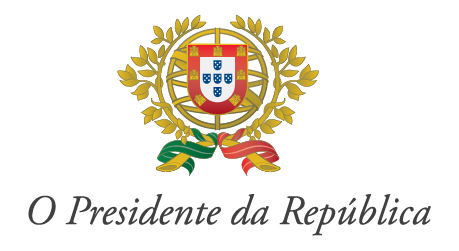
An initiative of:
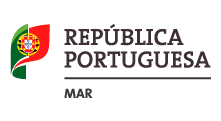
Co-Organization of:

Official Partner:
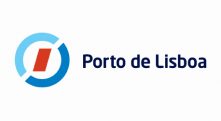
Main Partner:

Institutional Partners:
